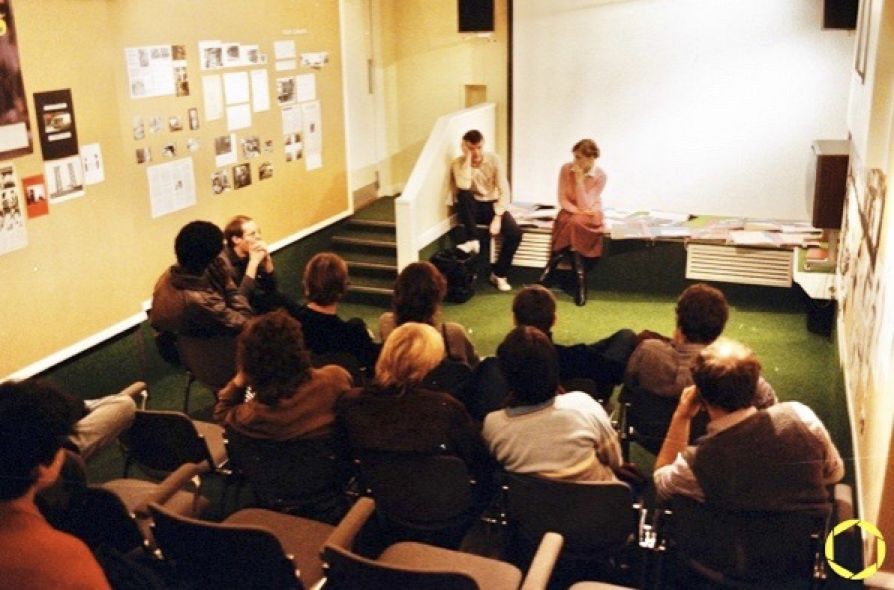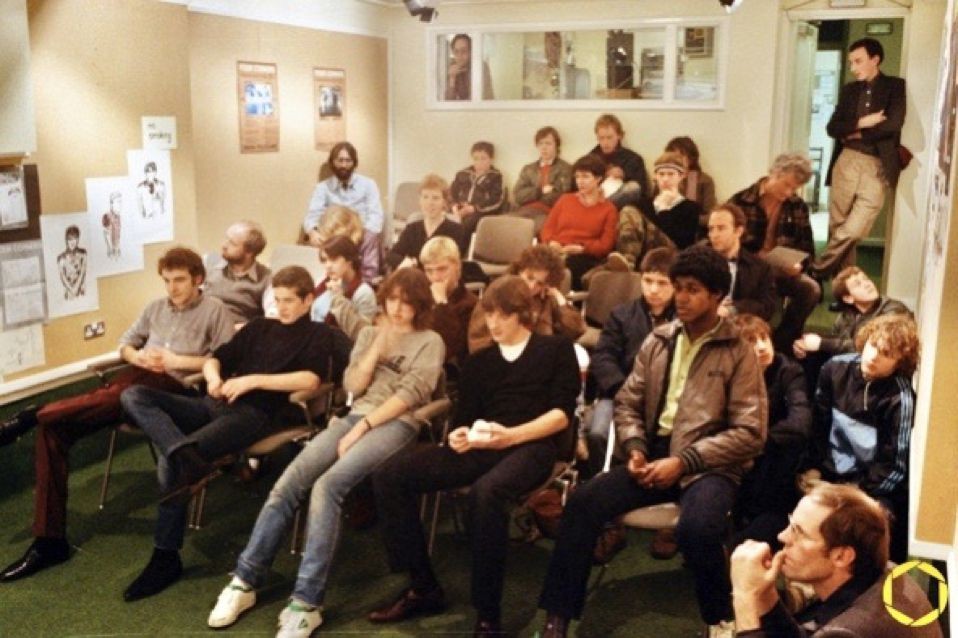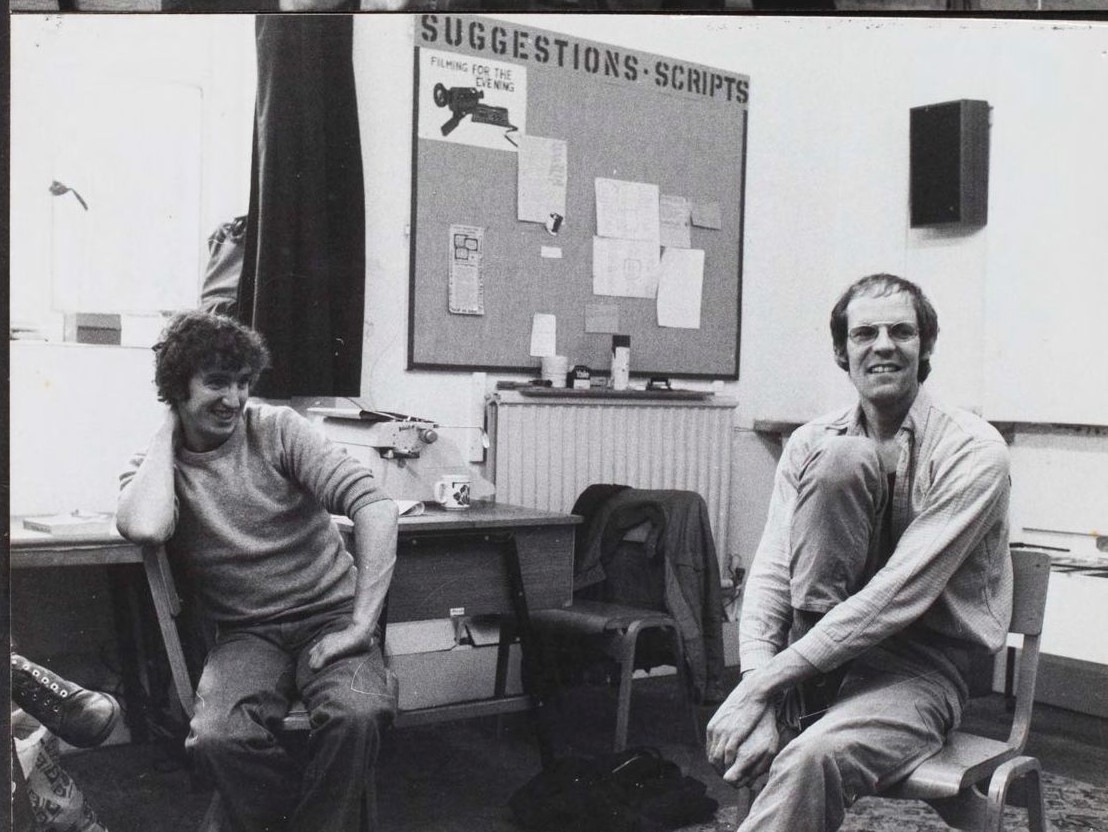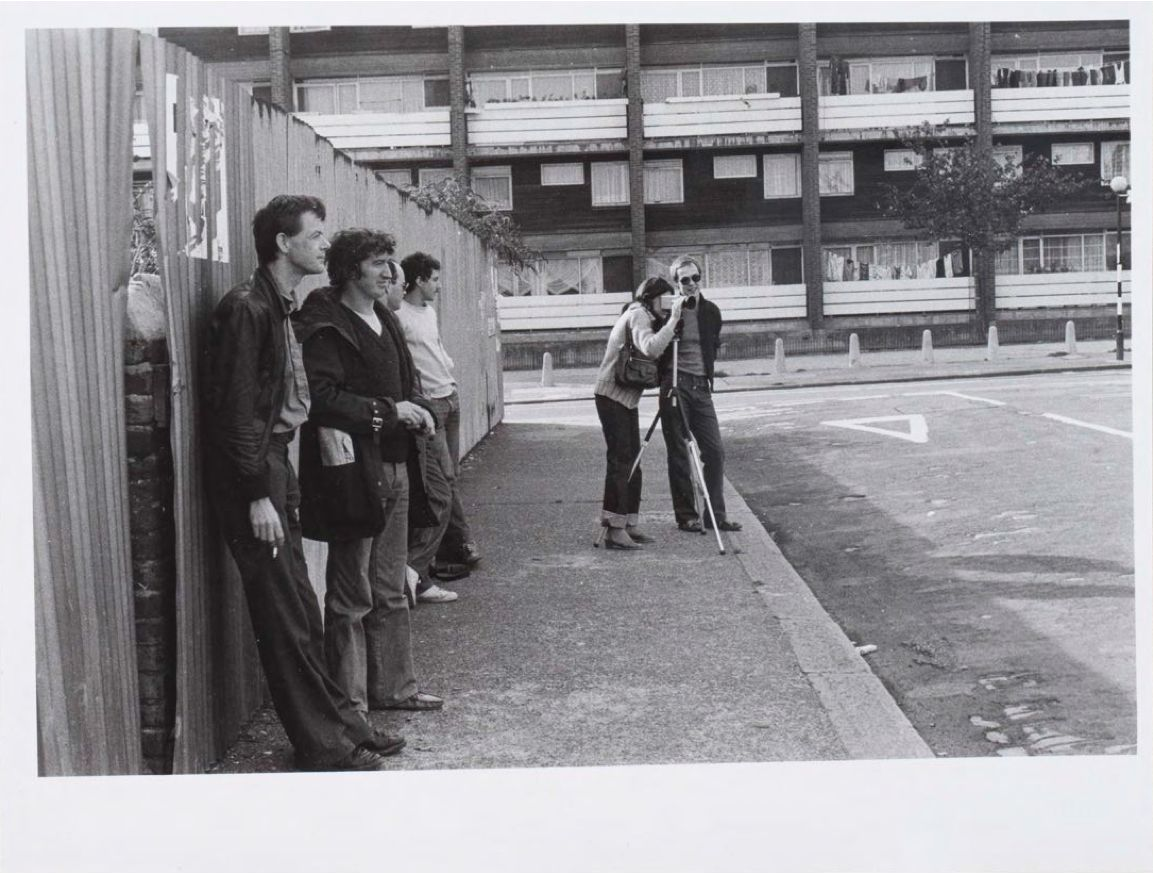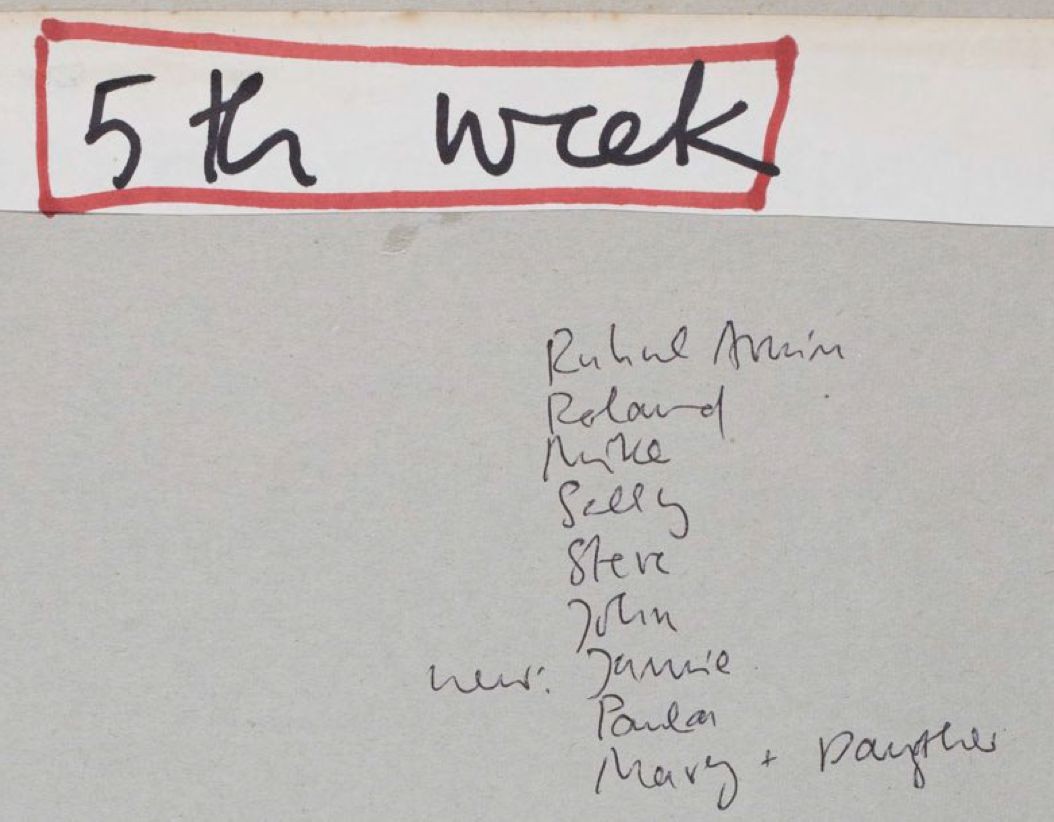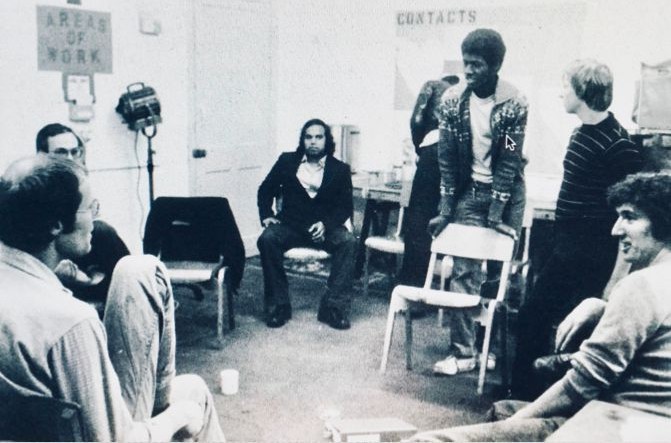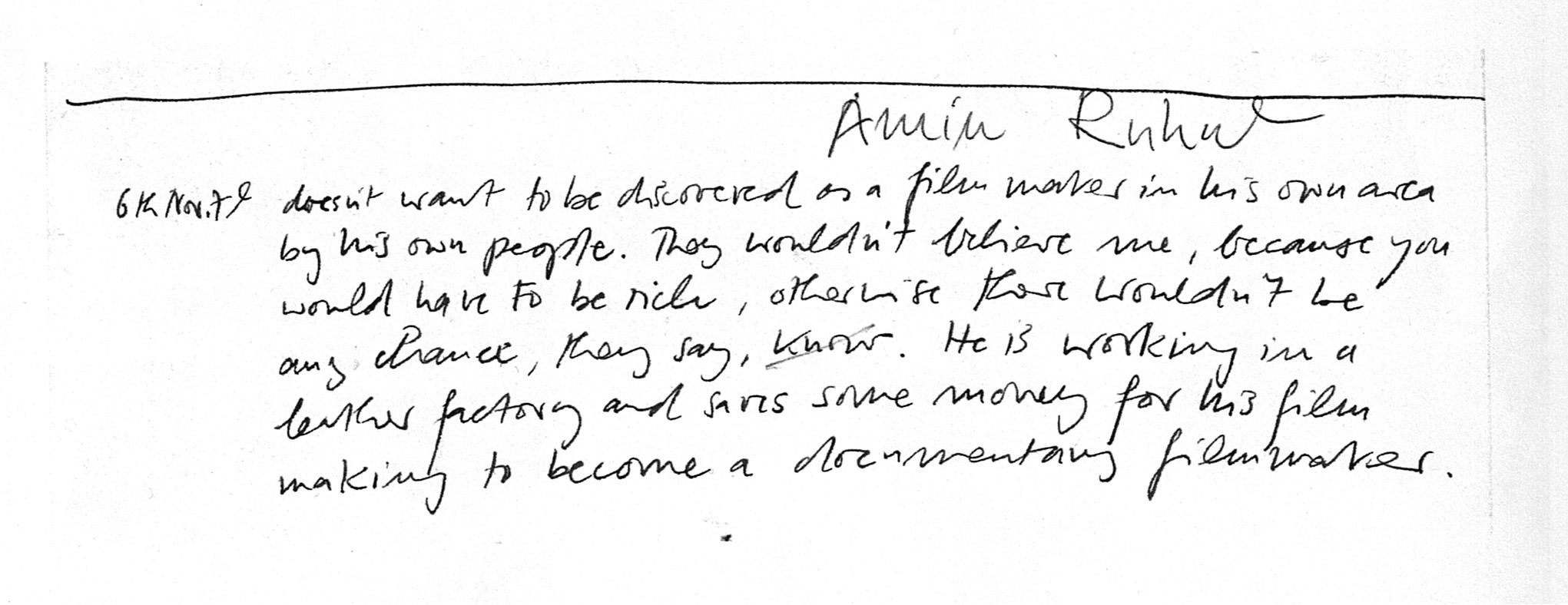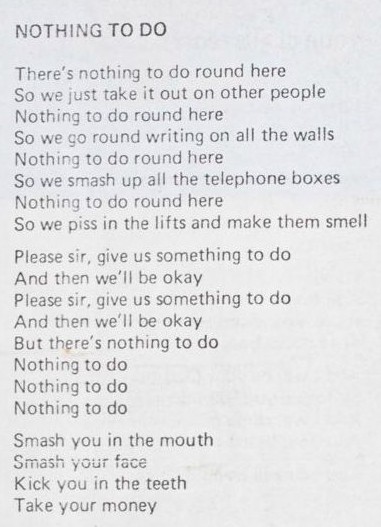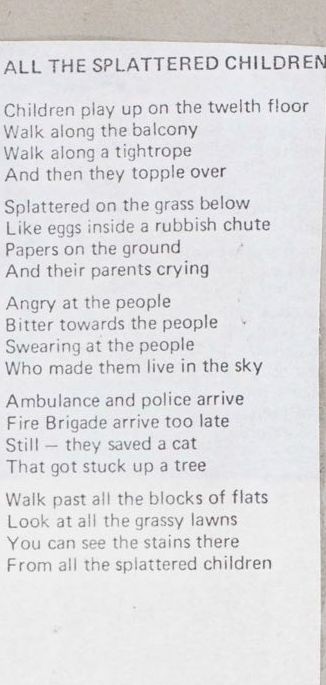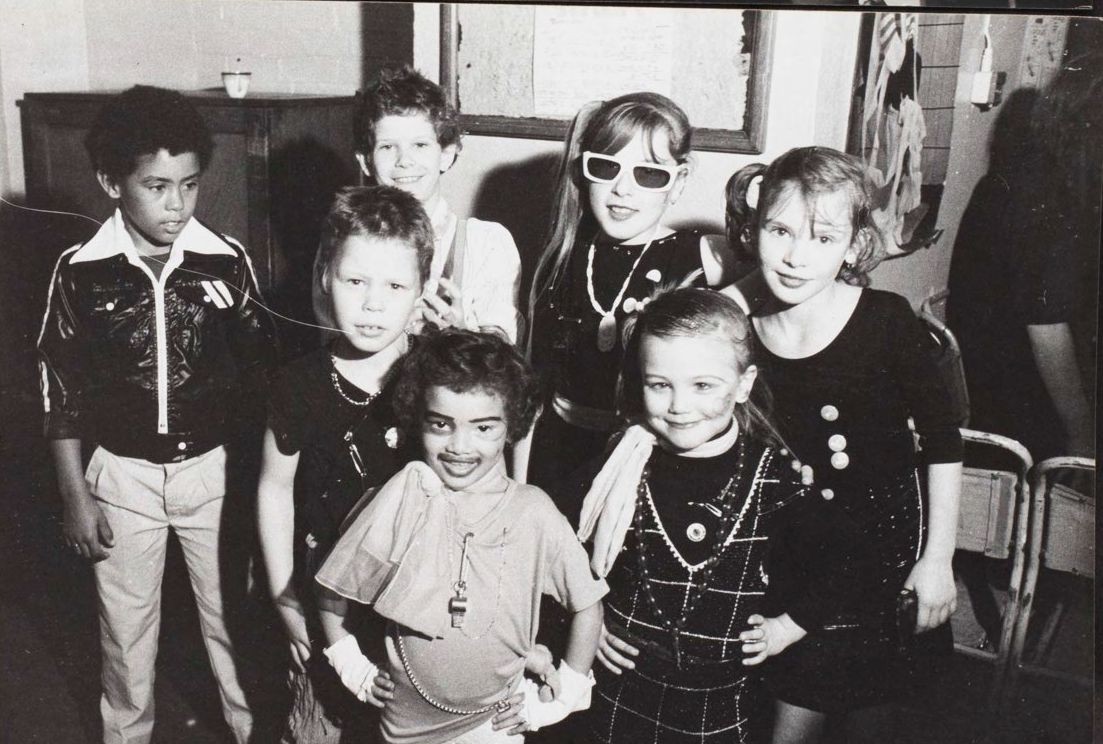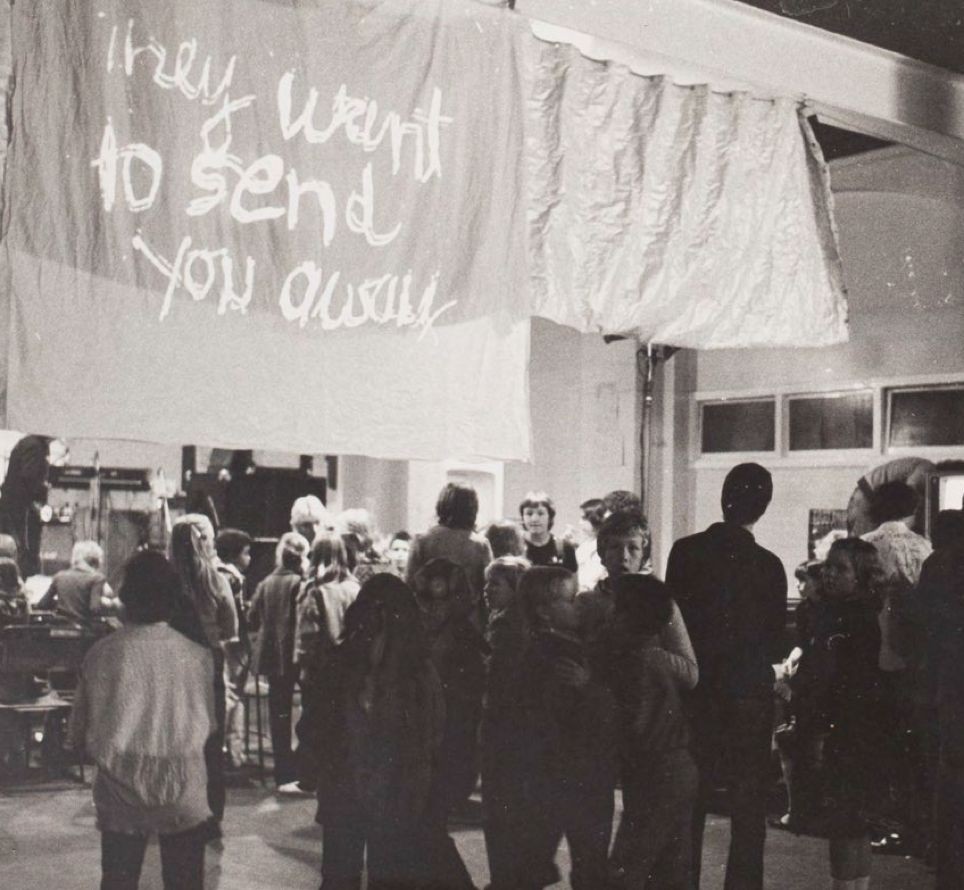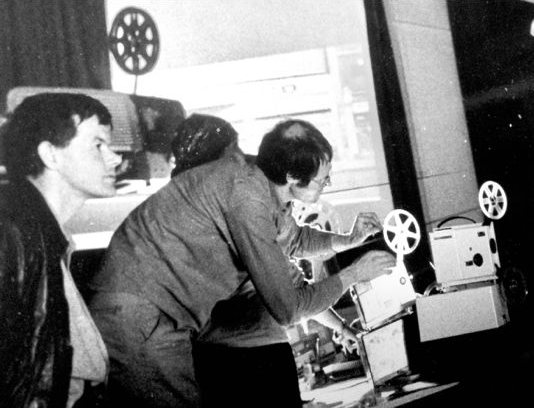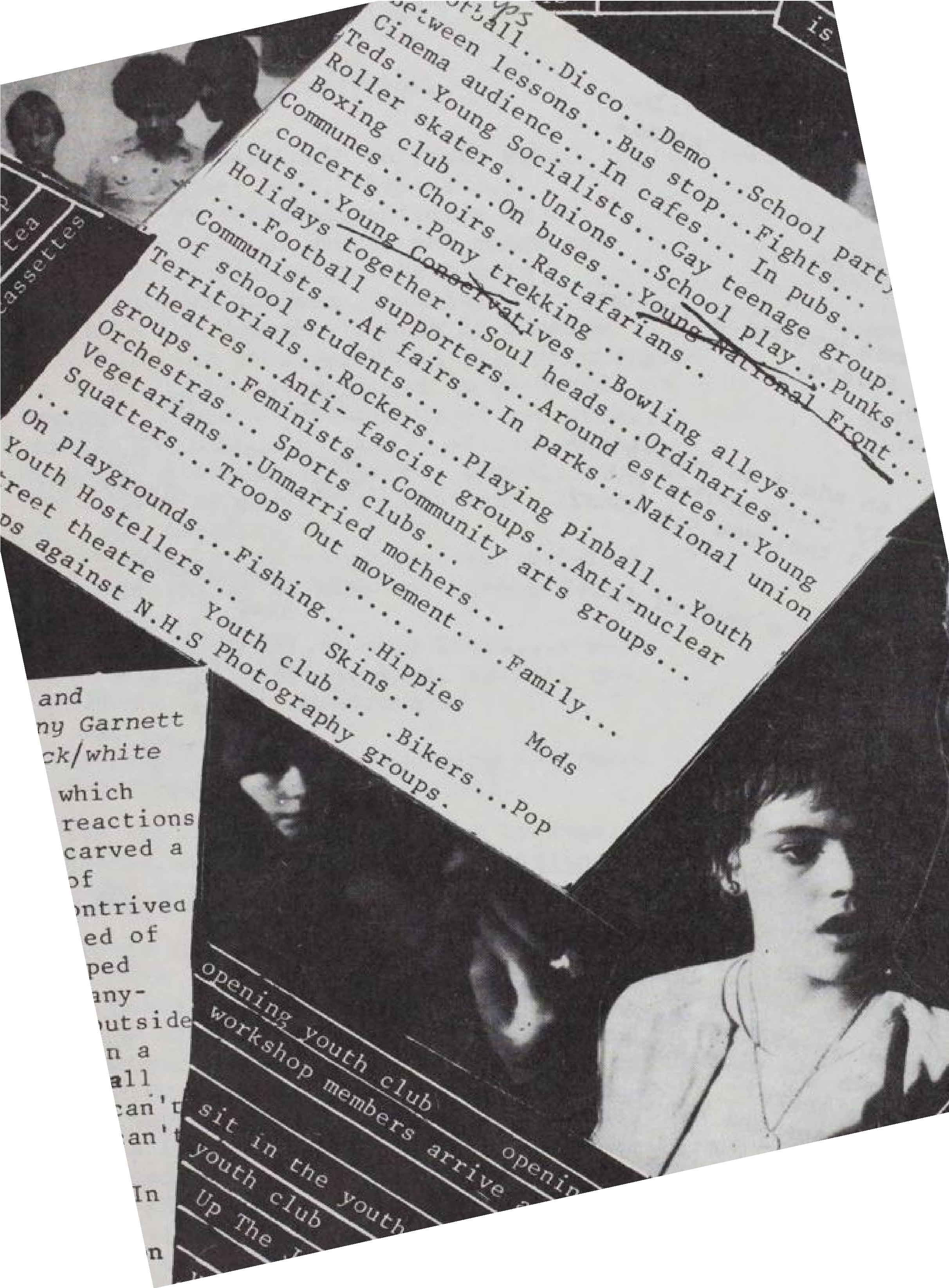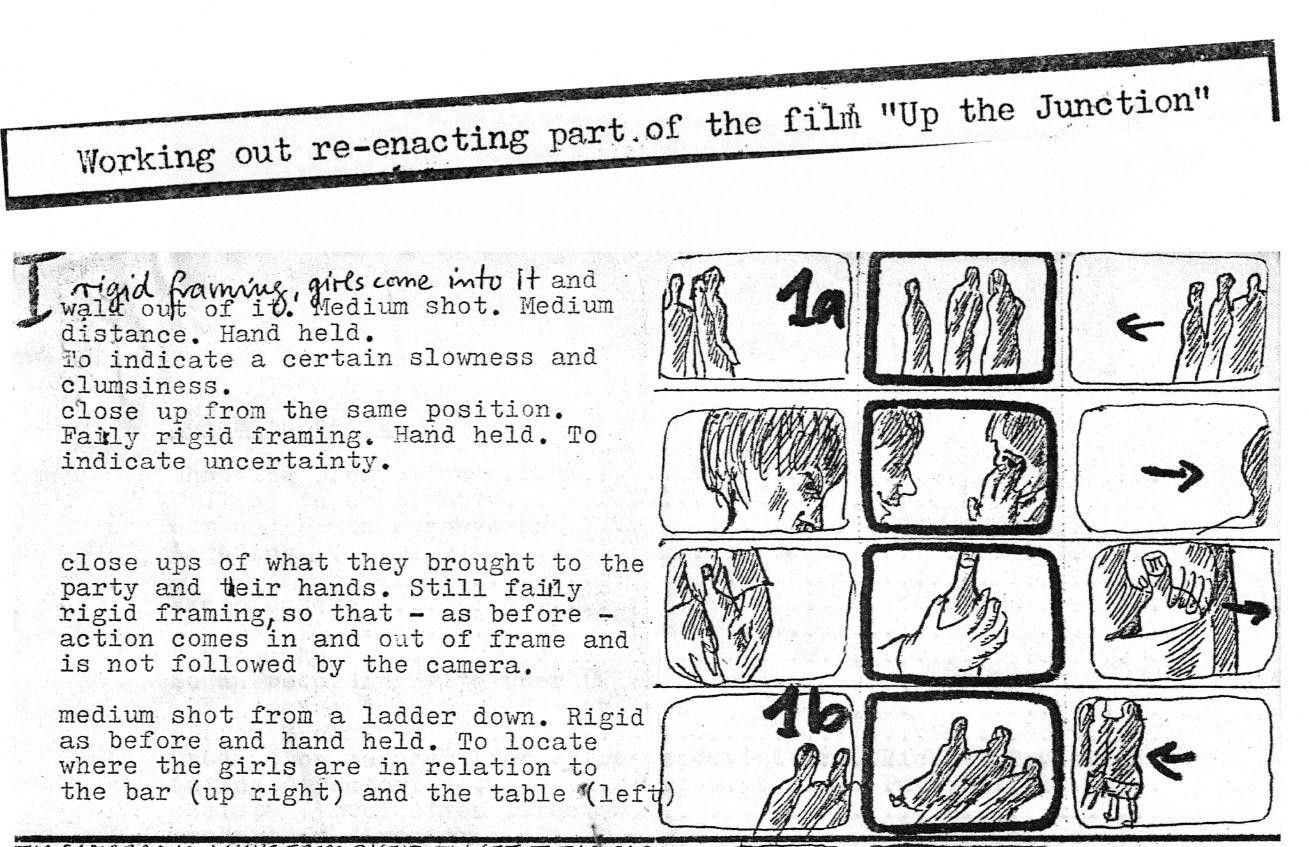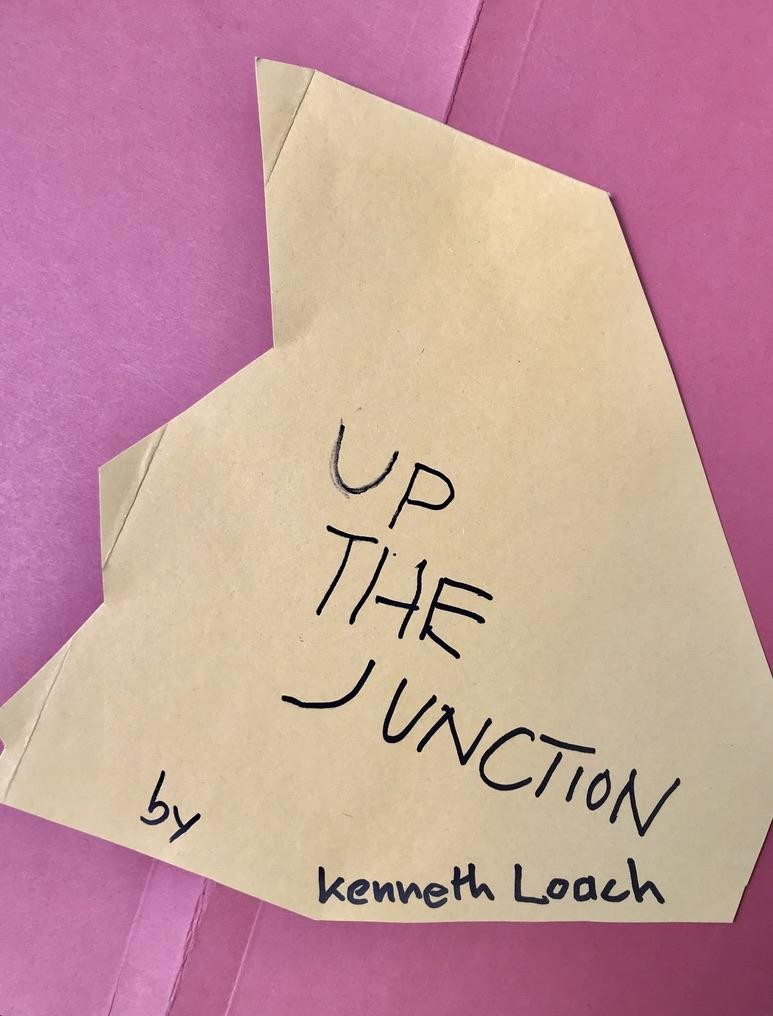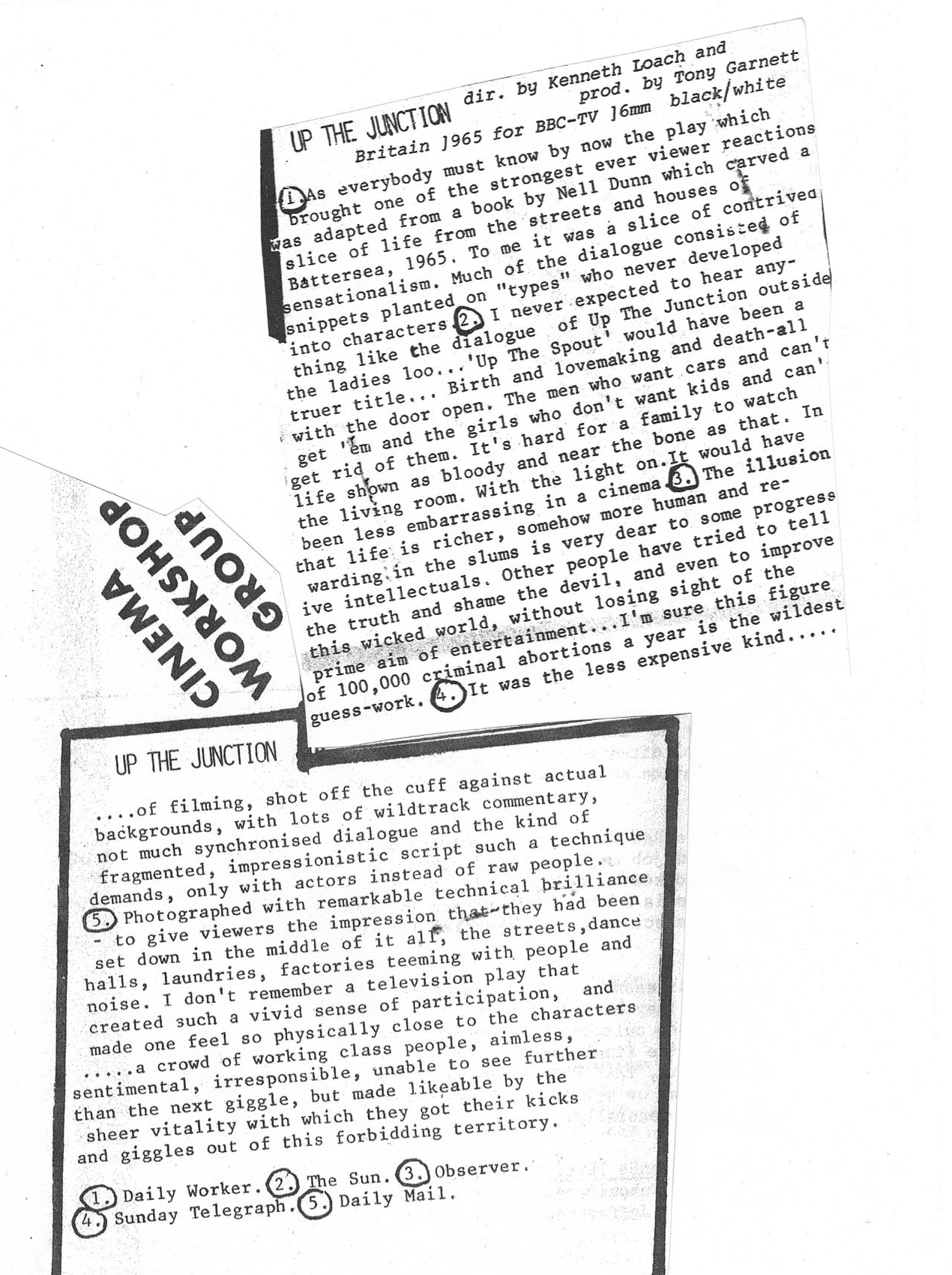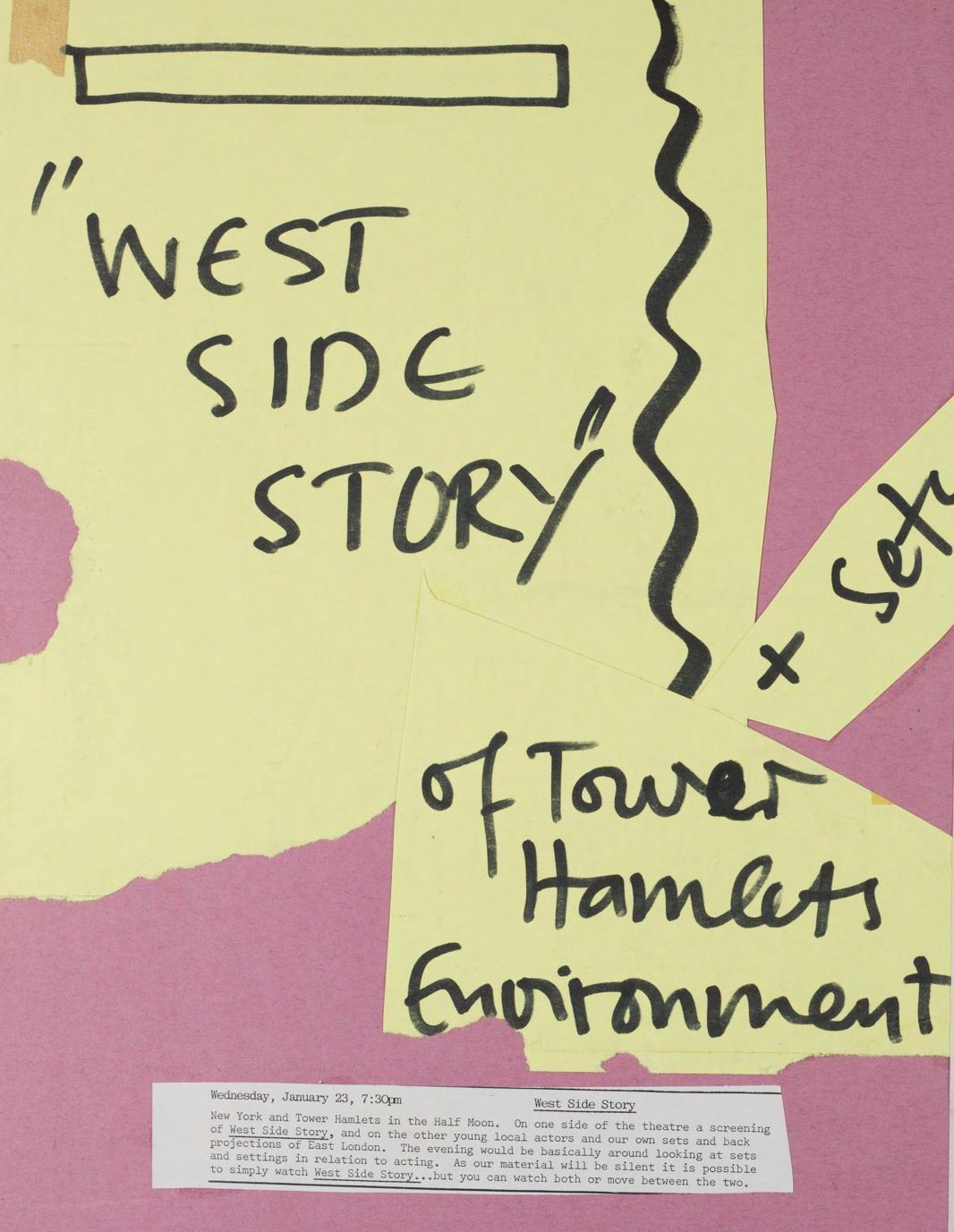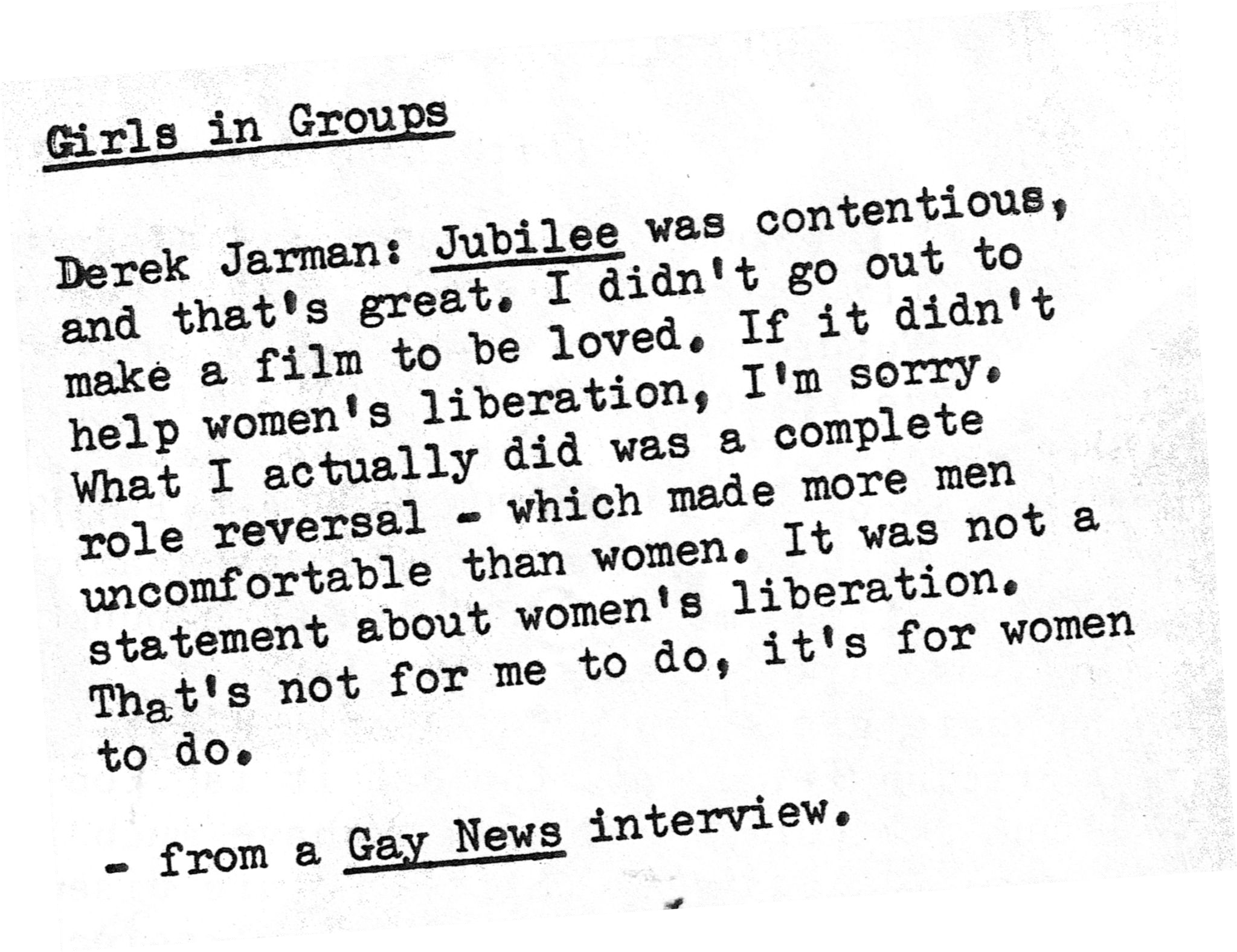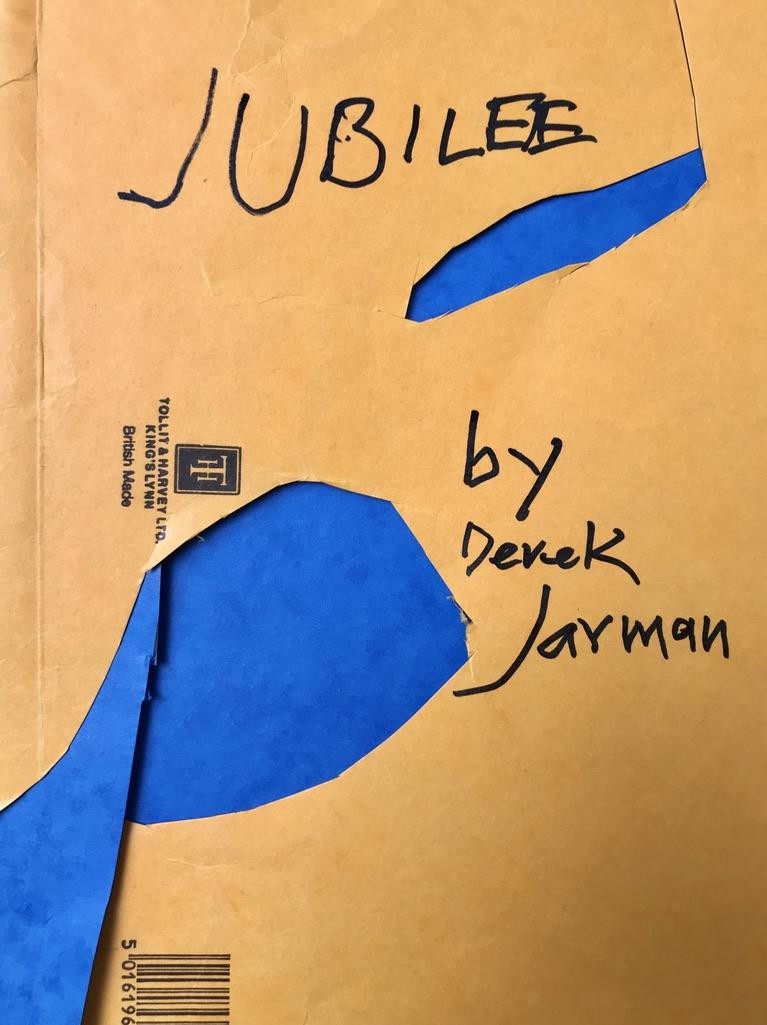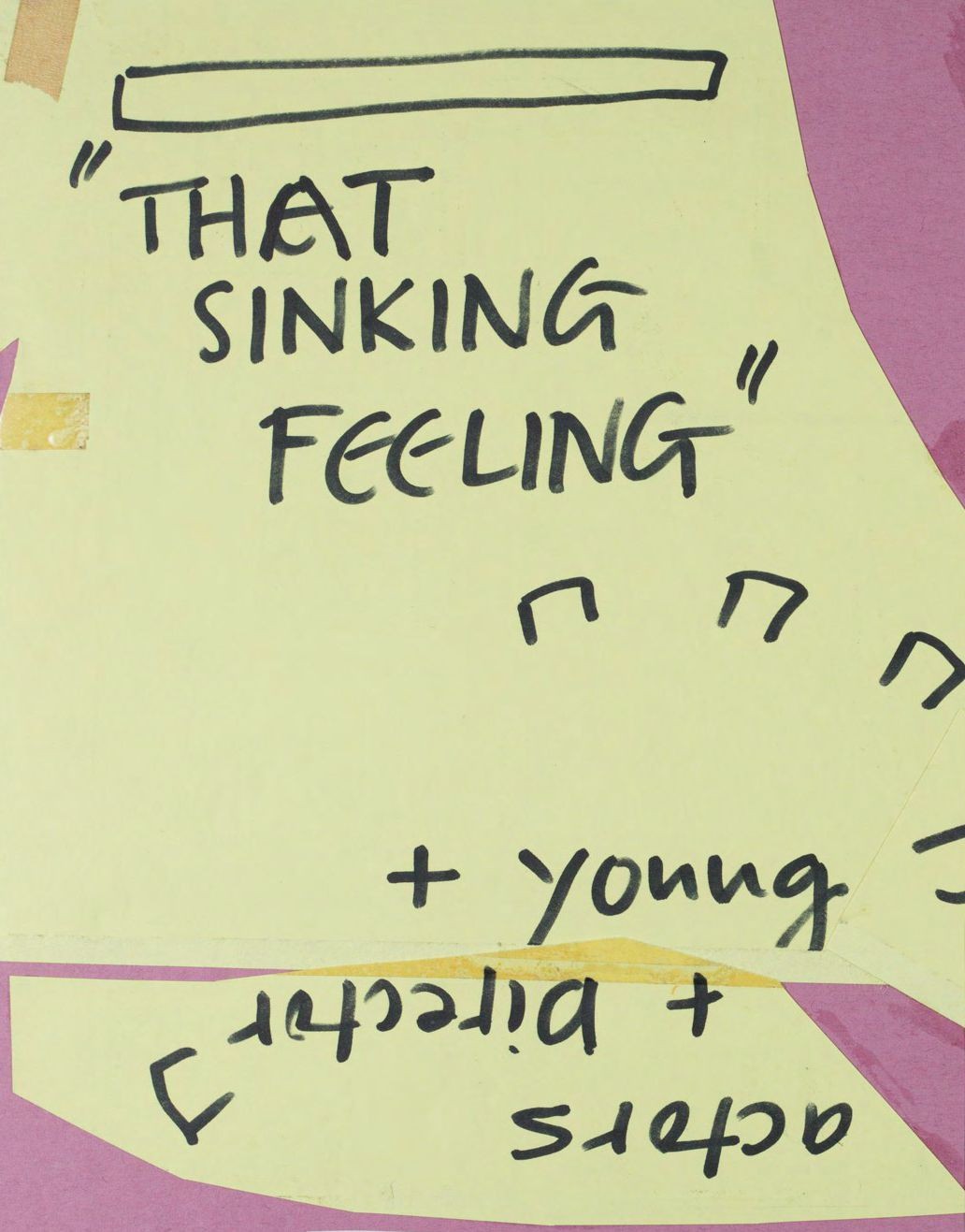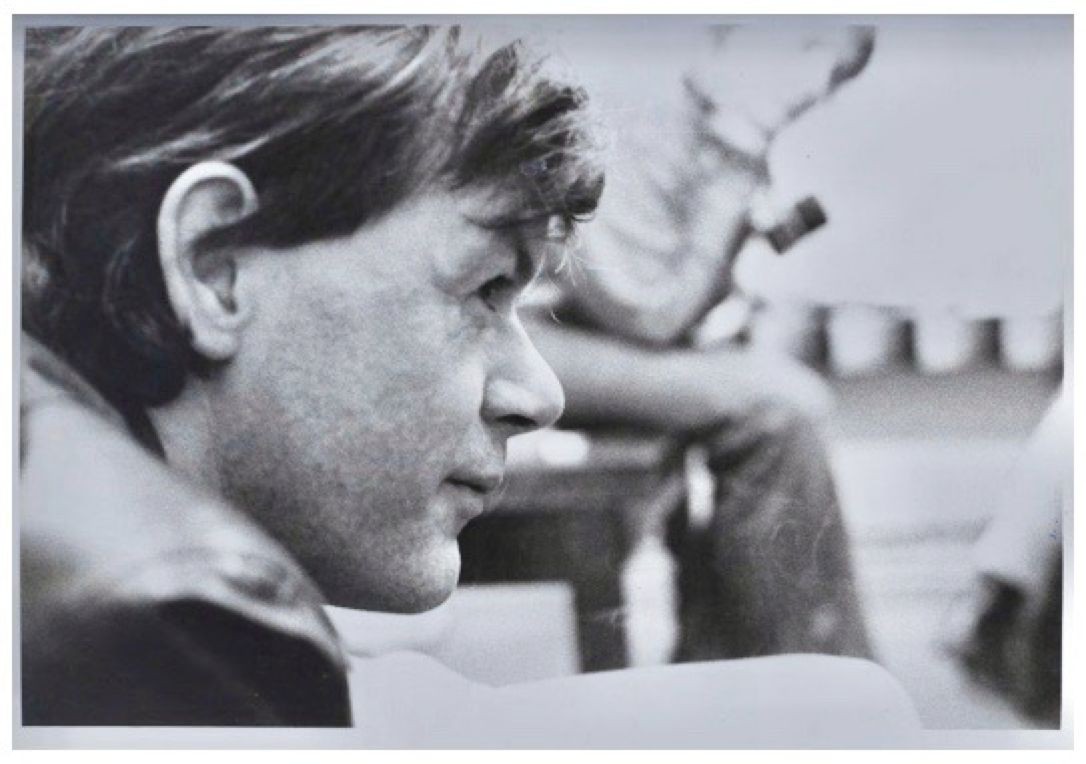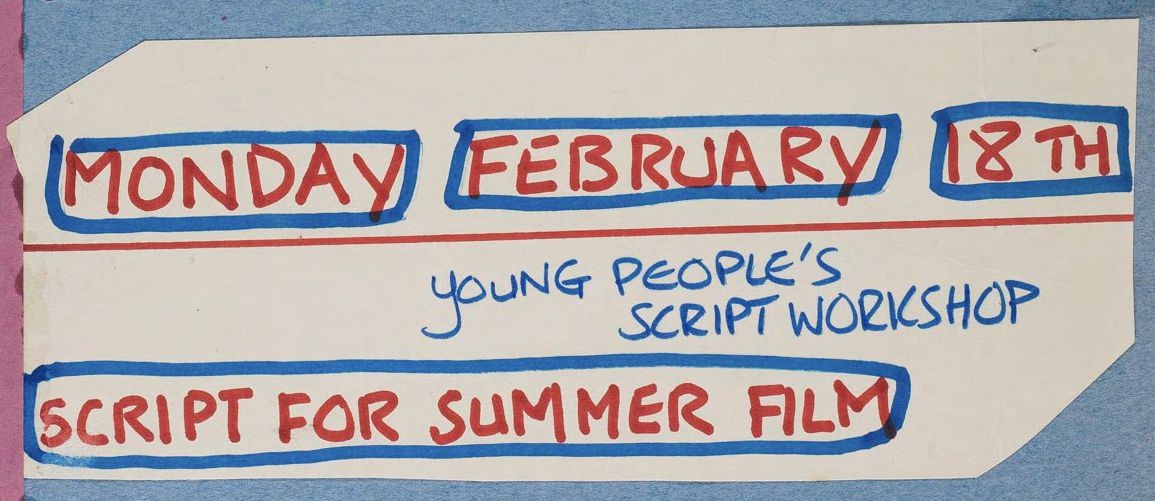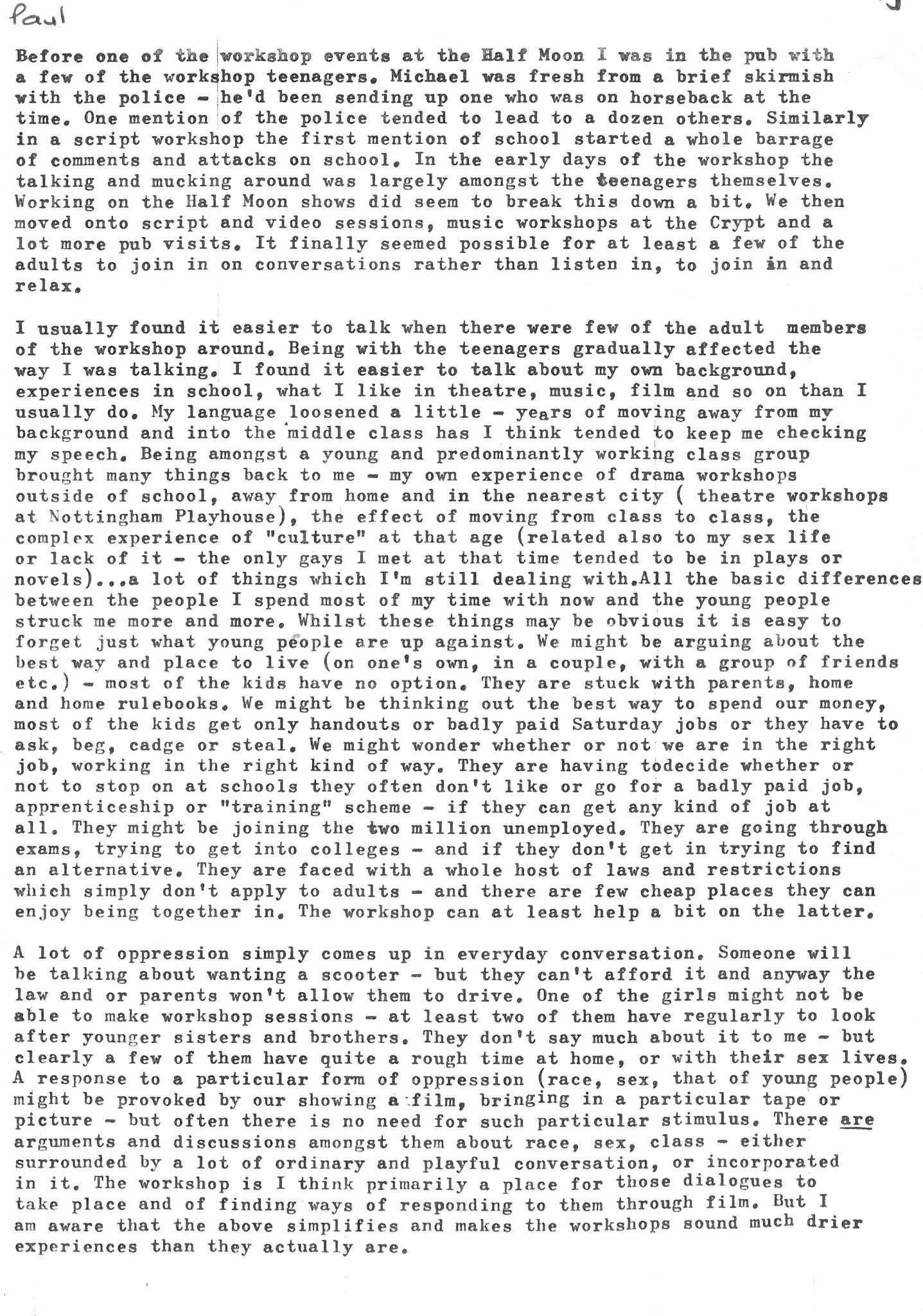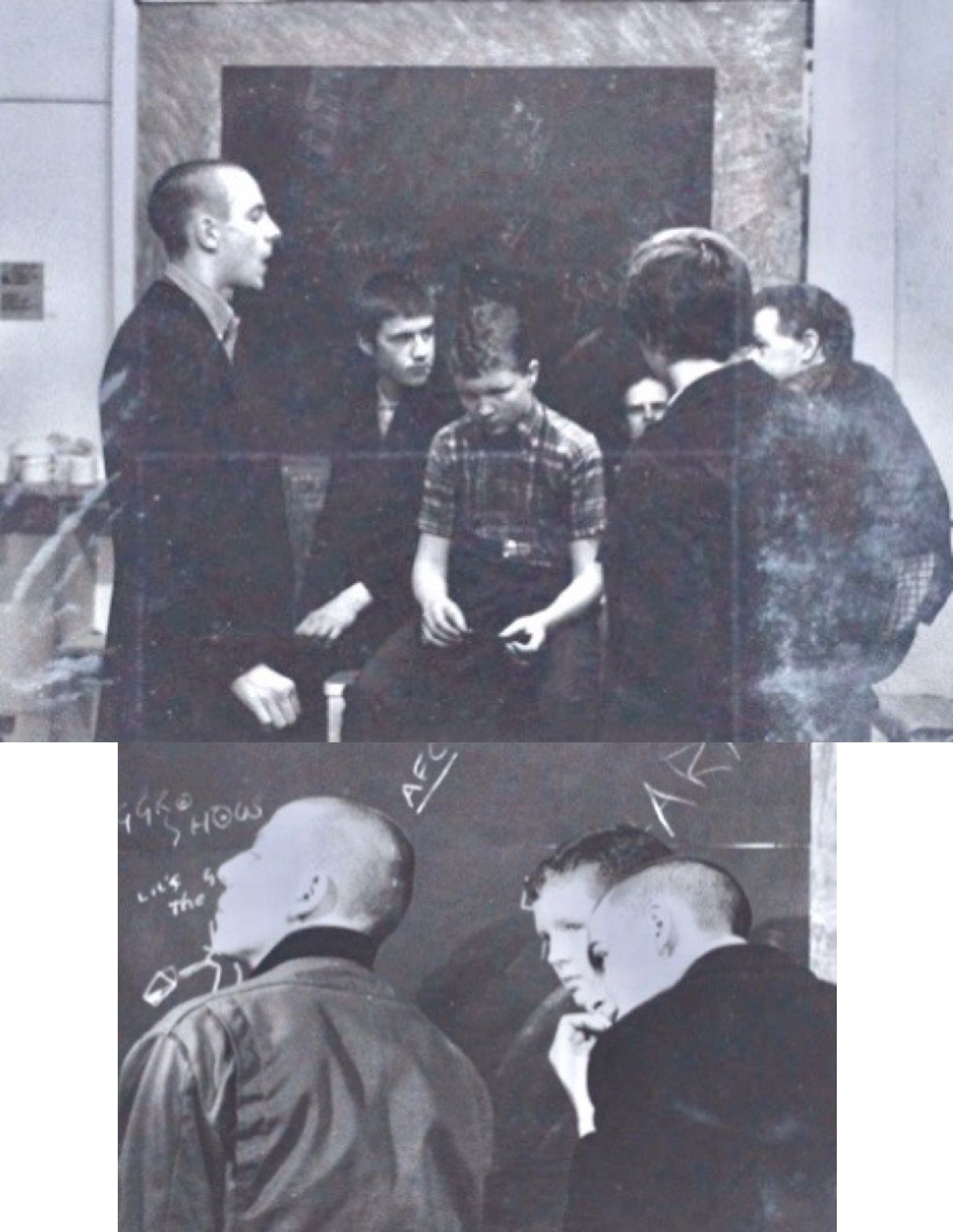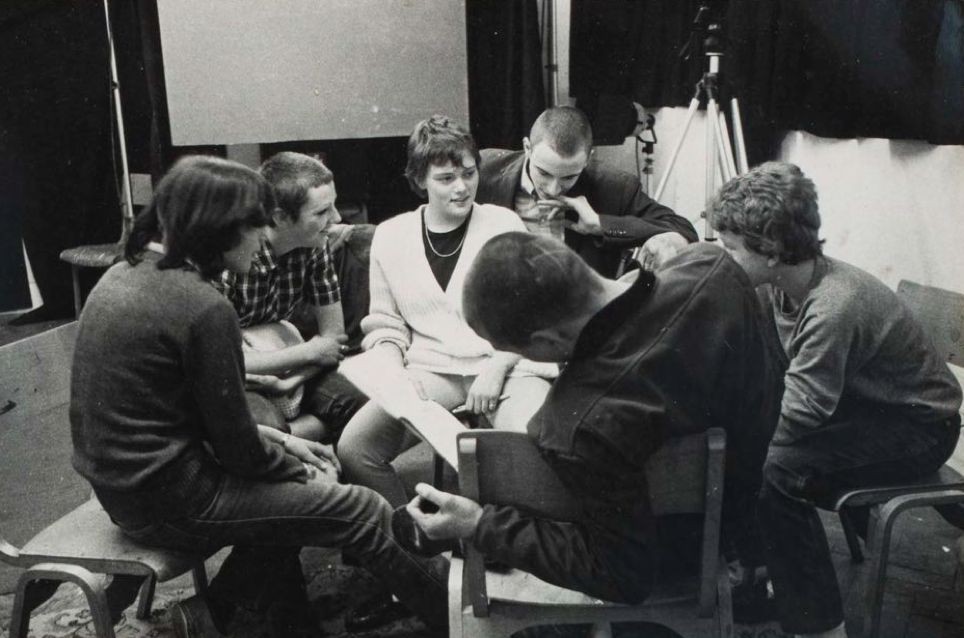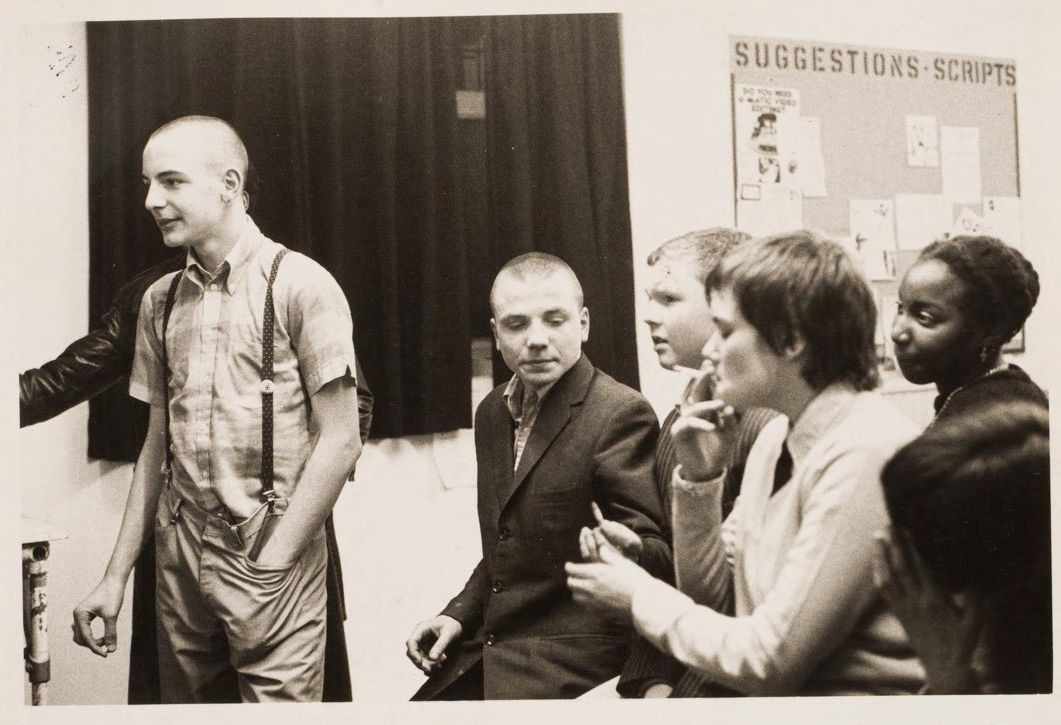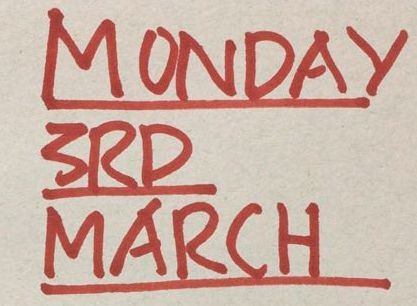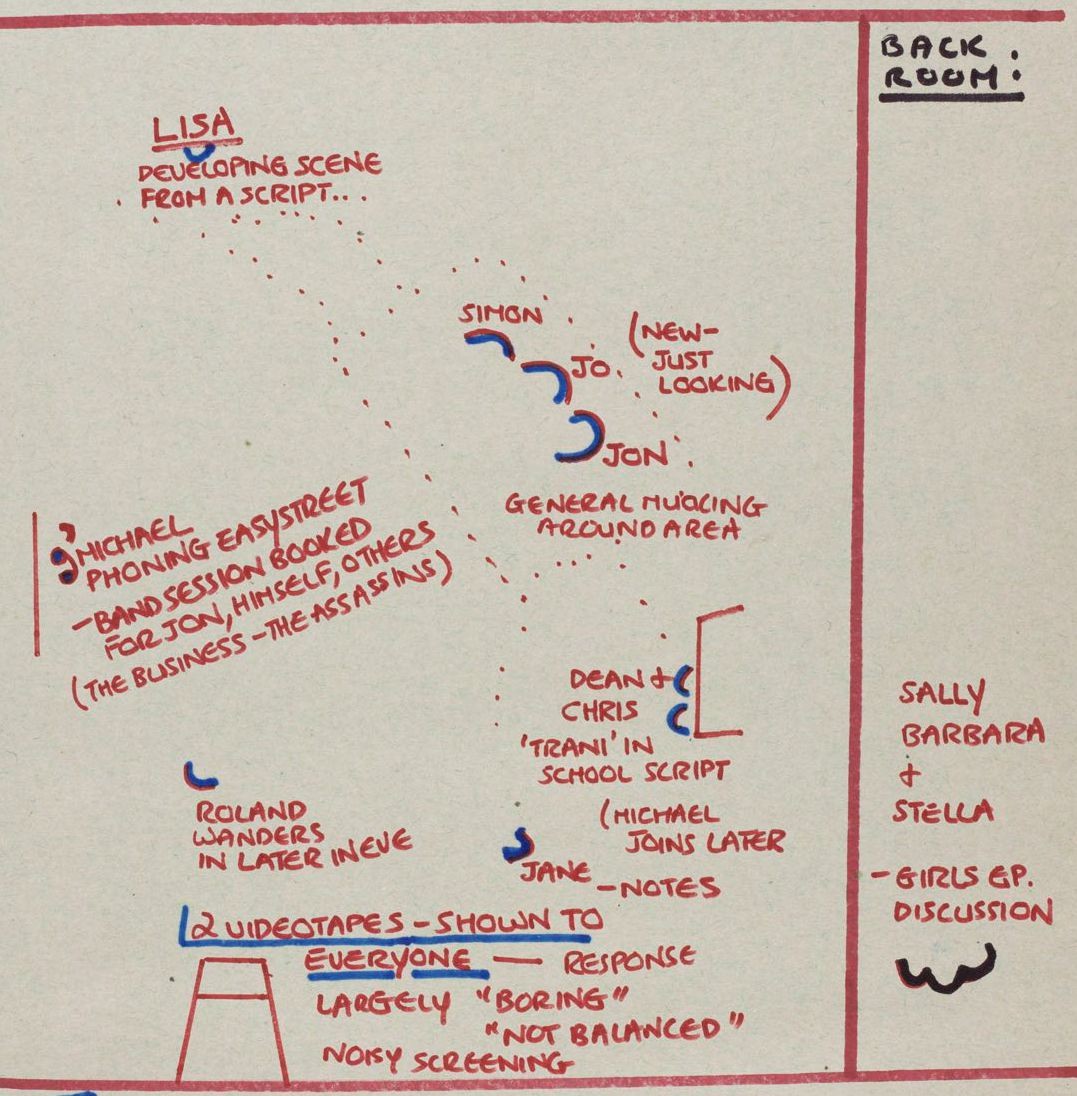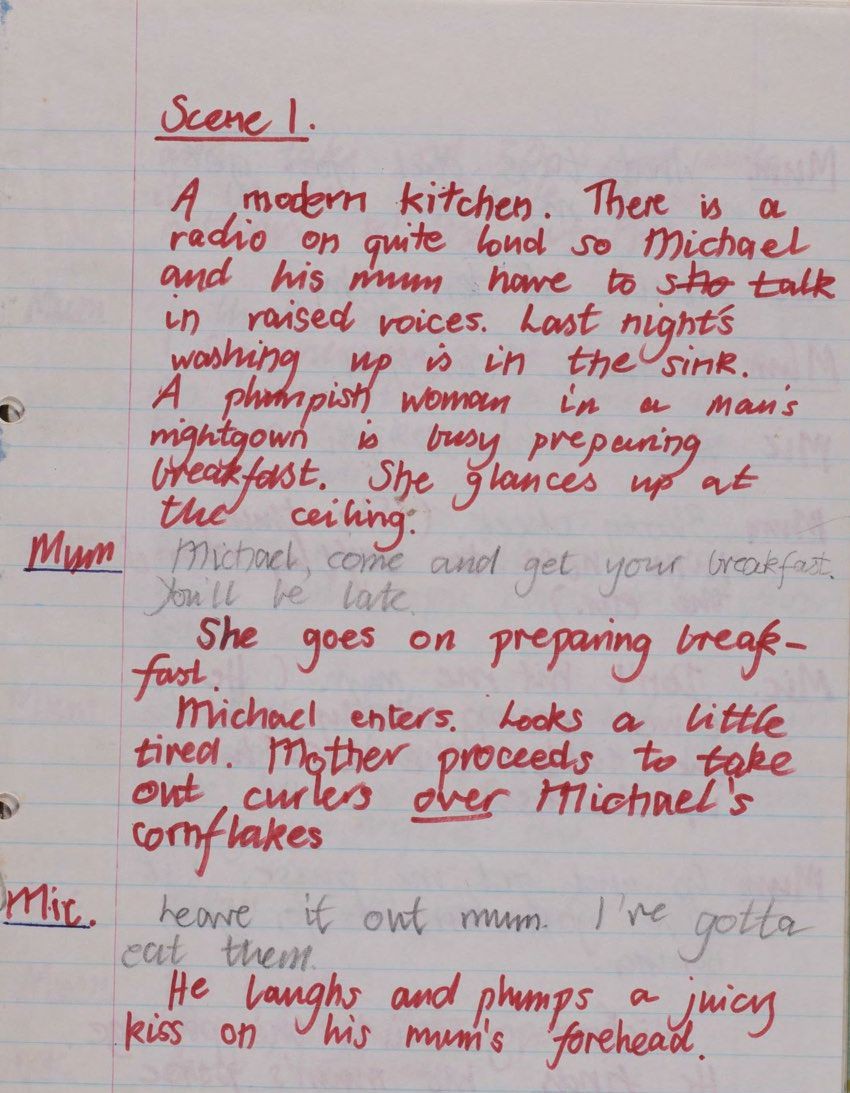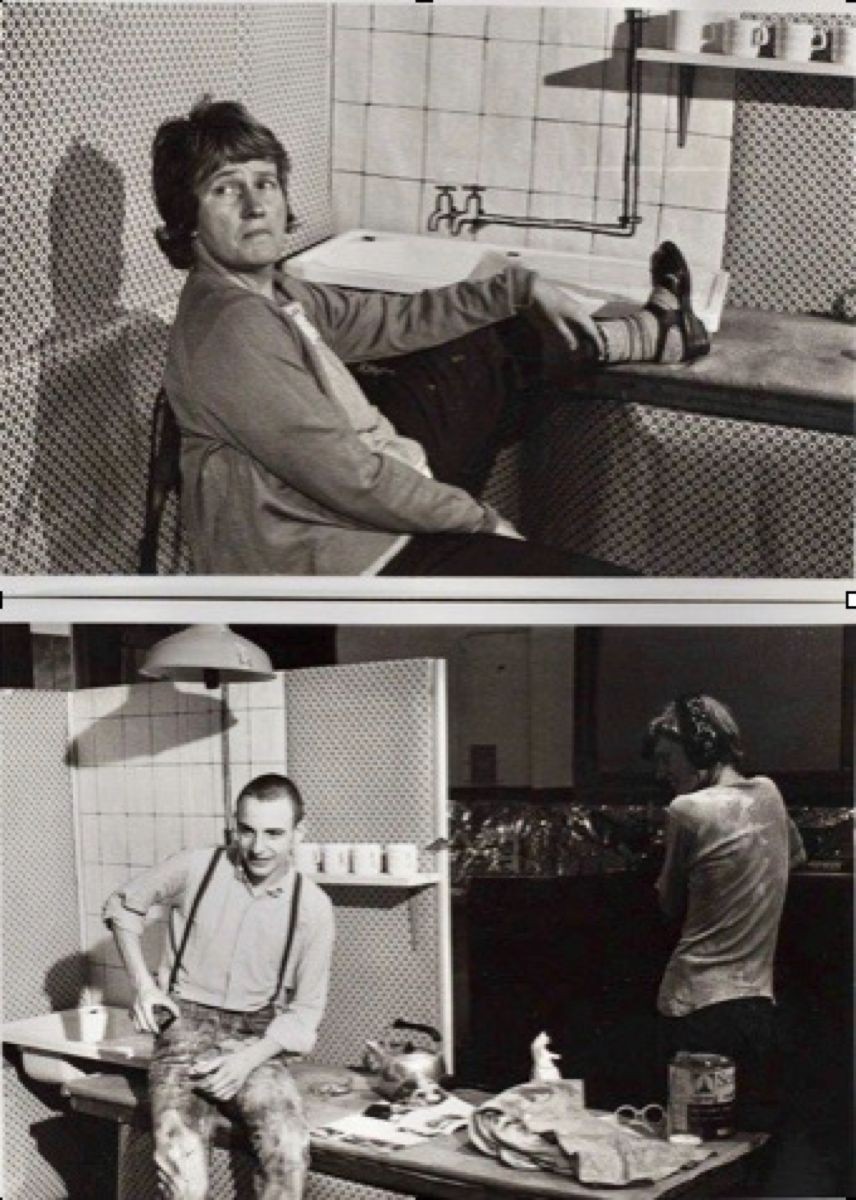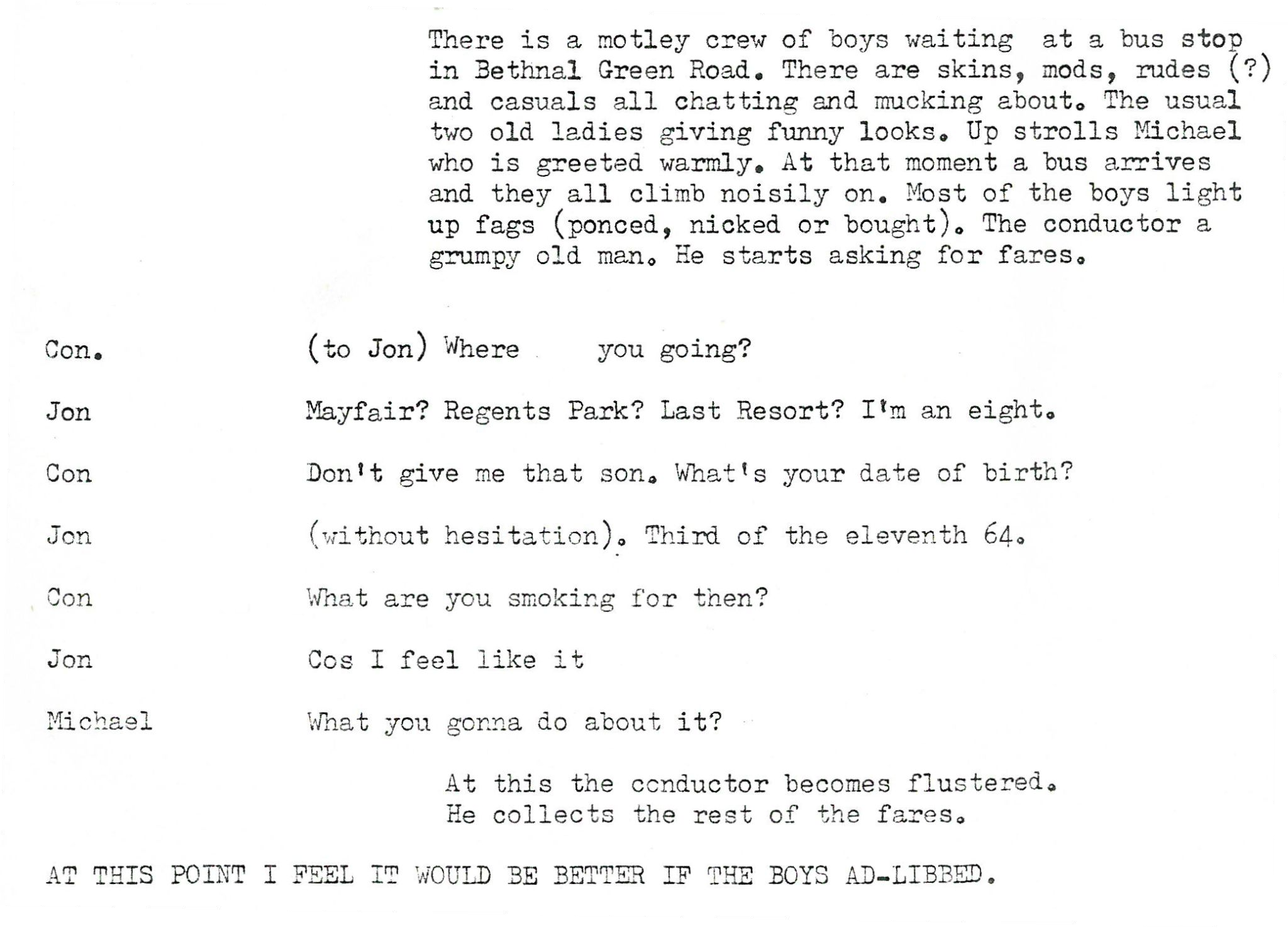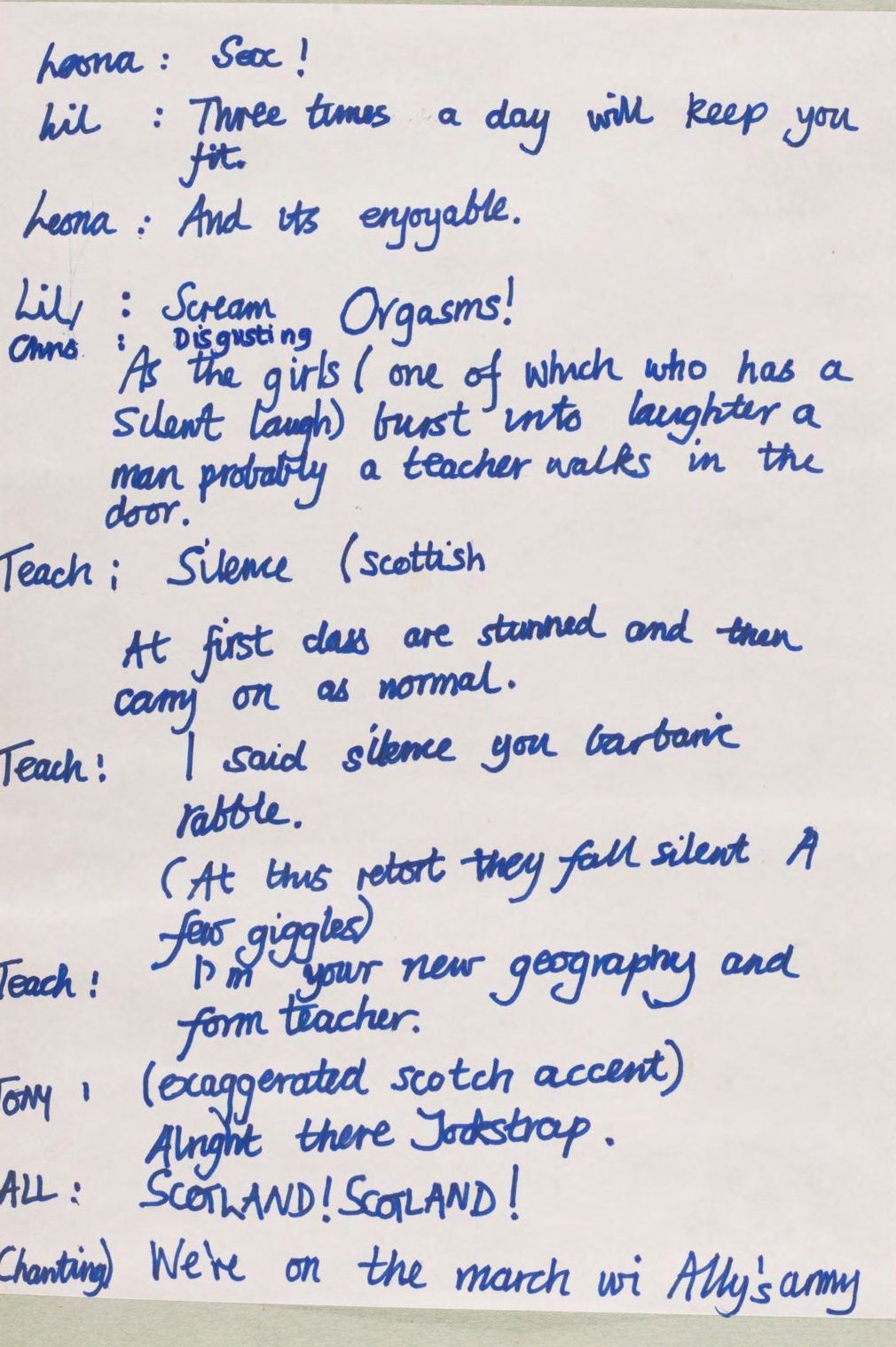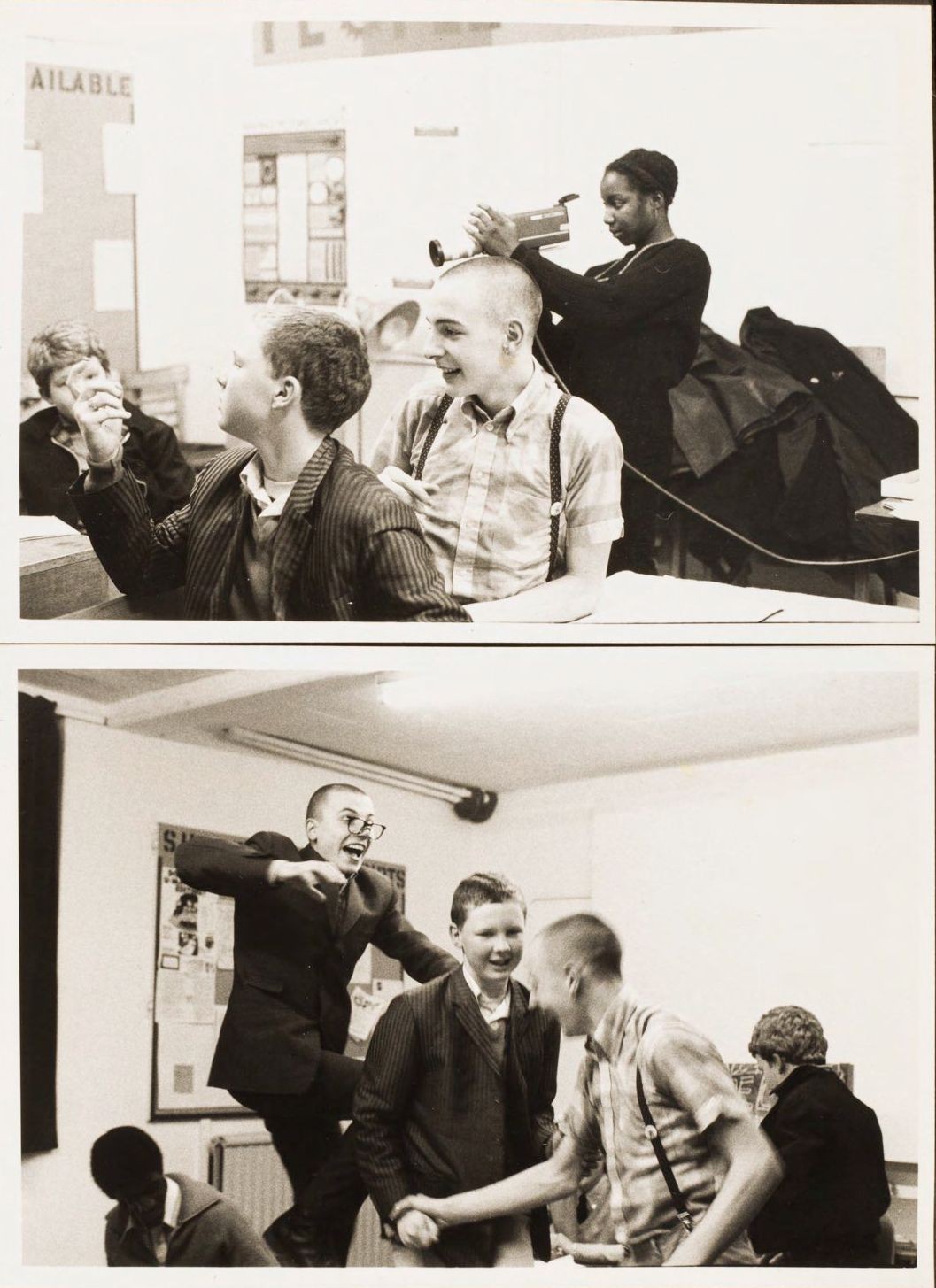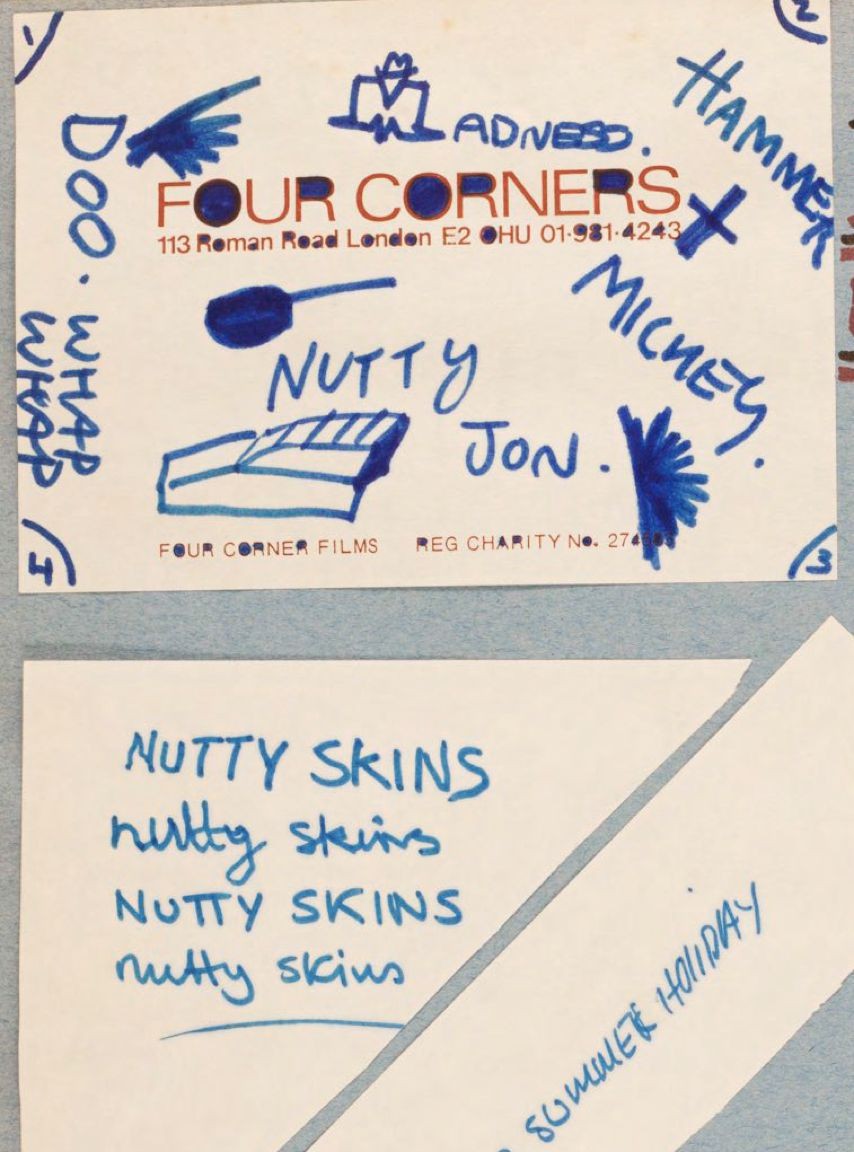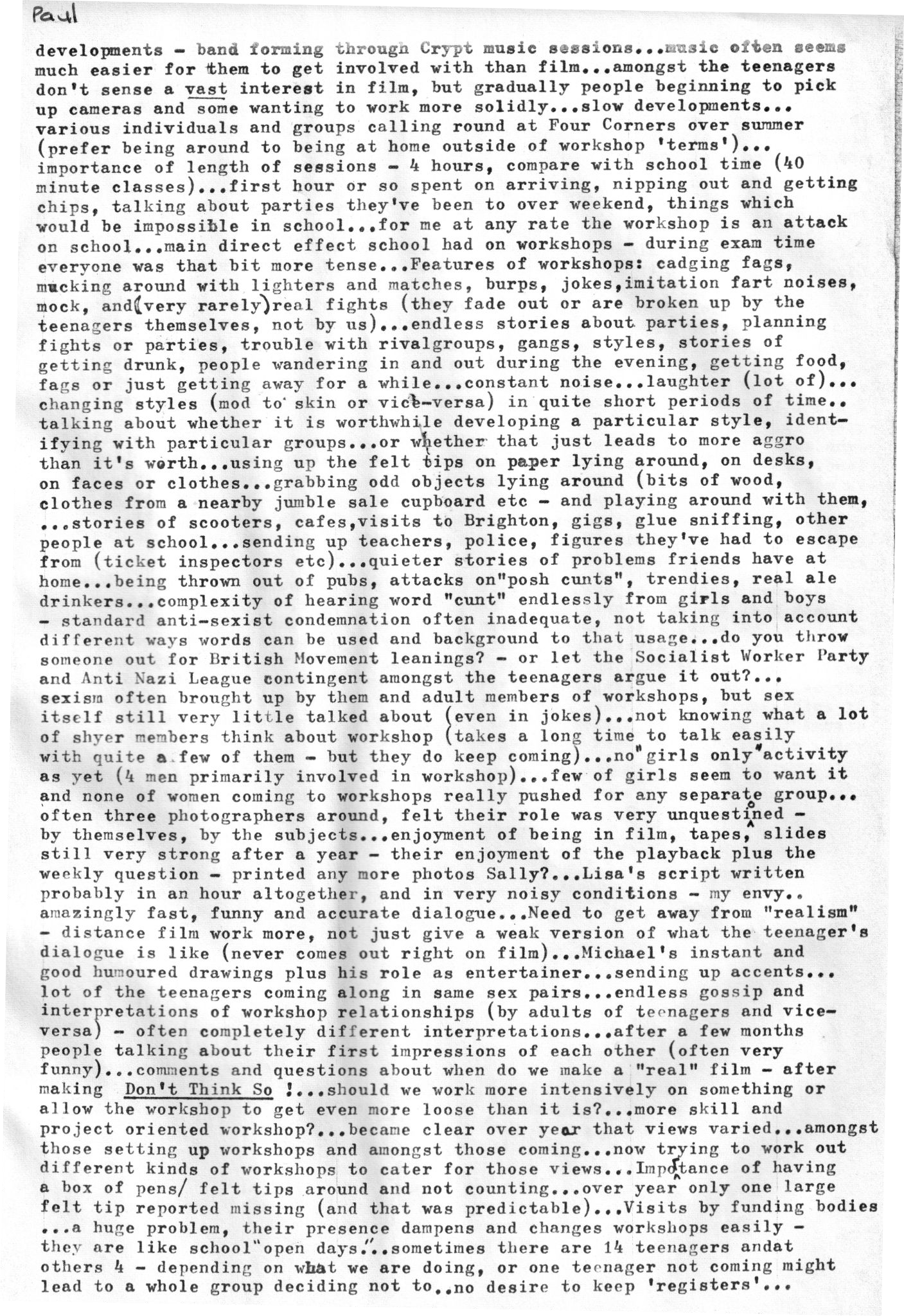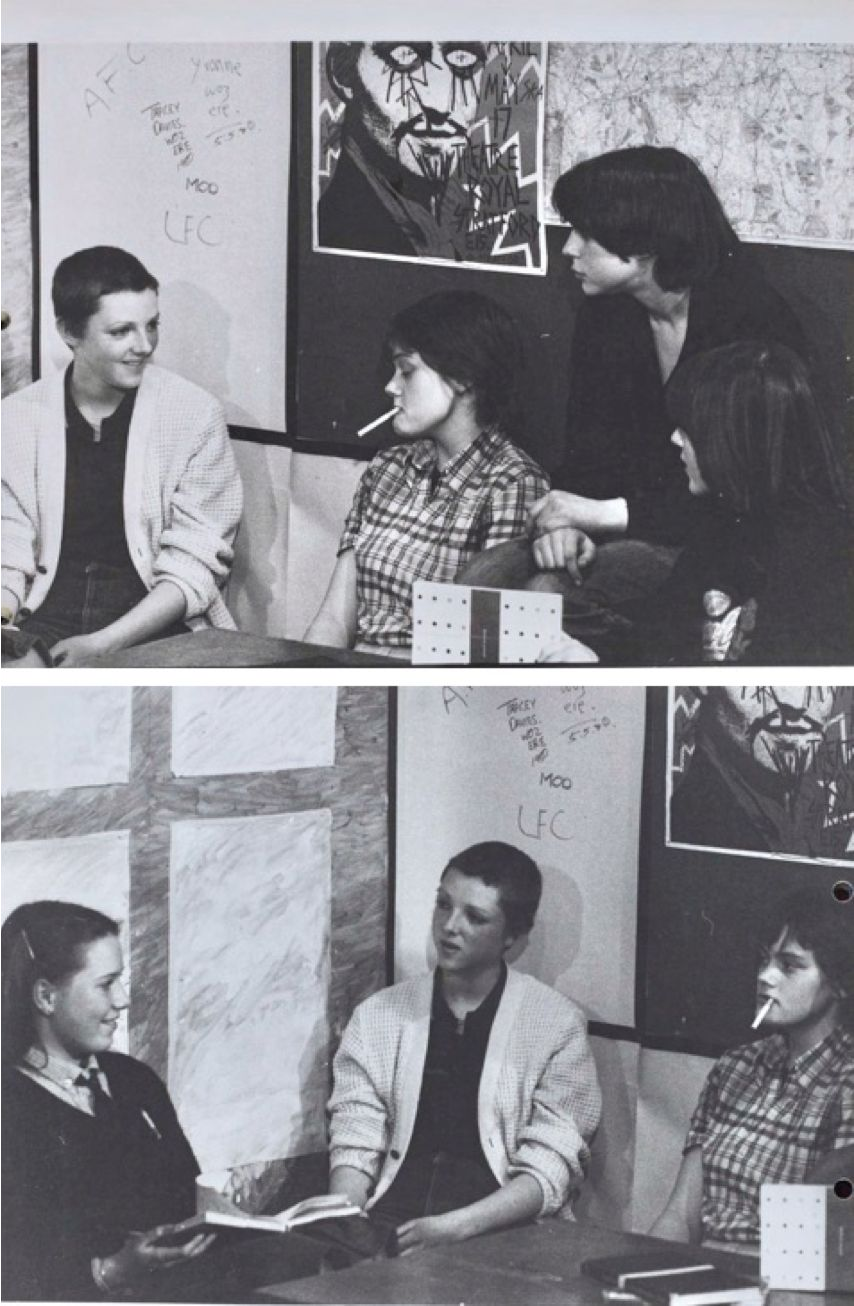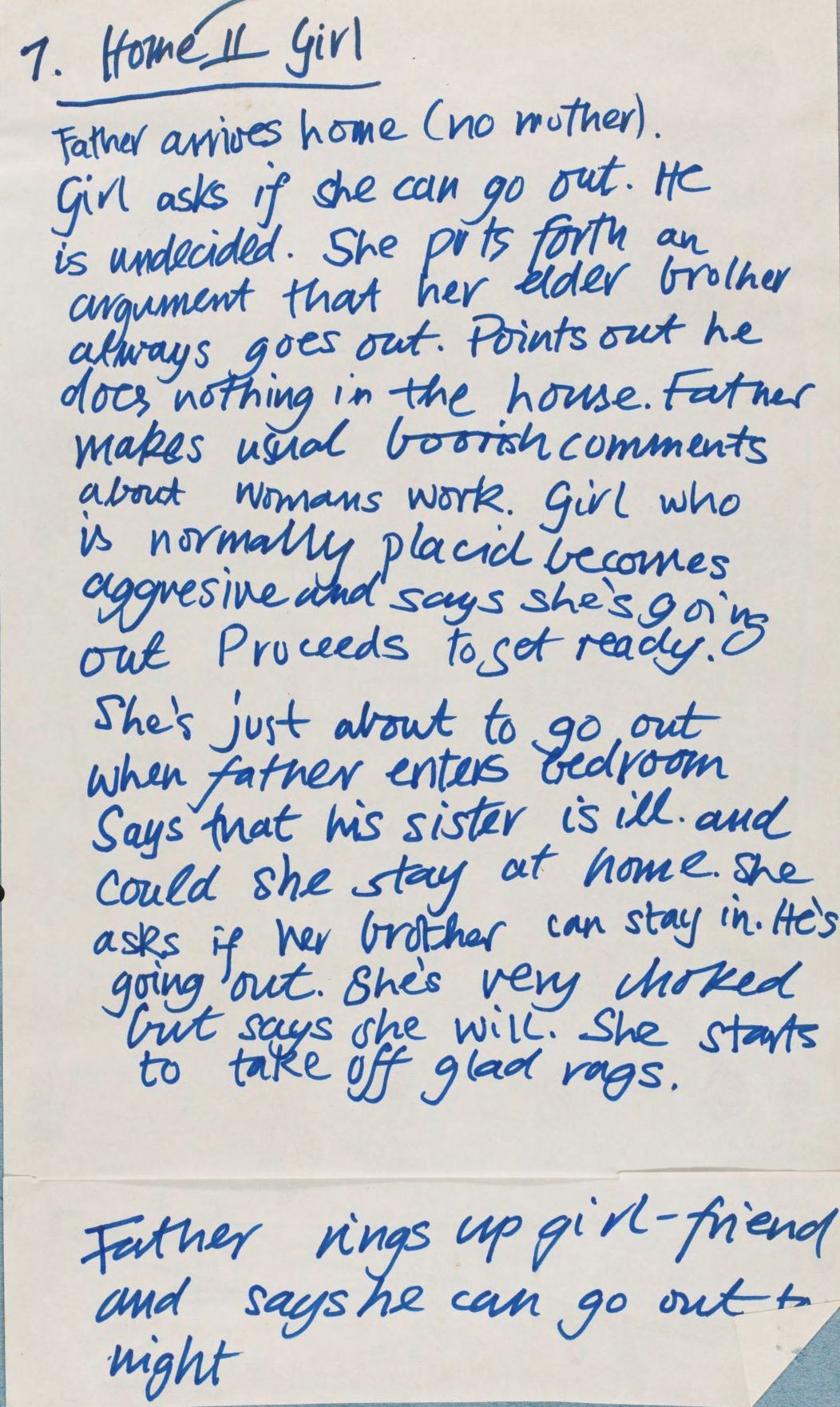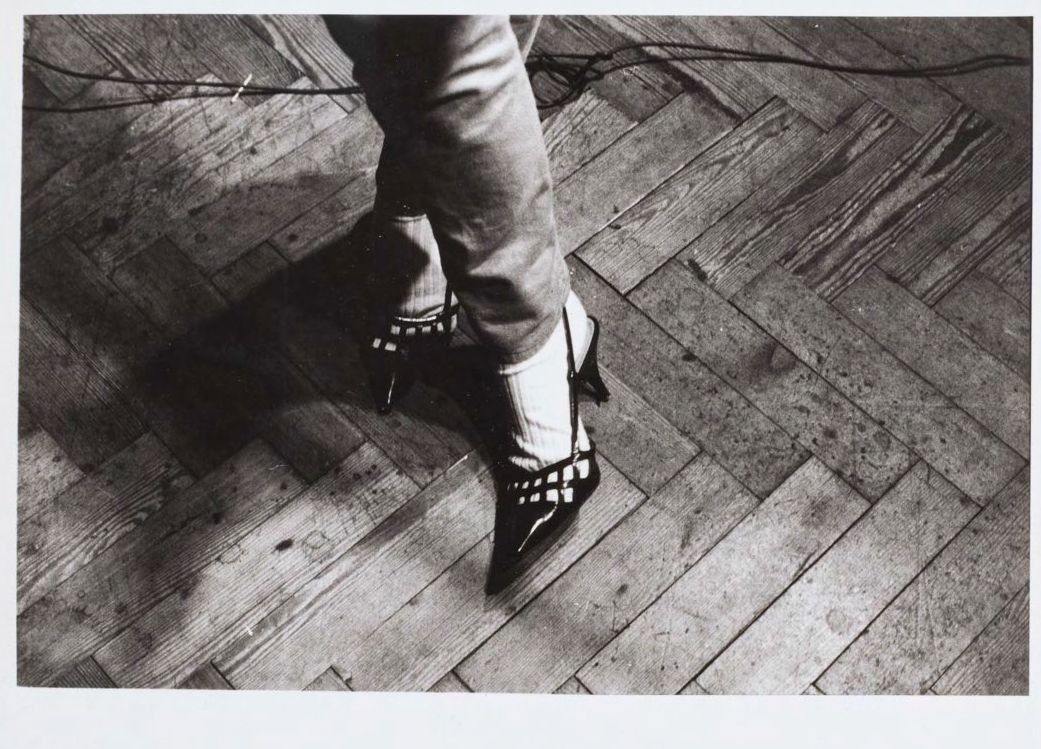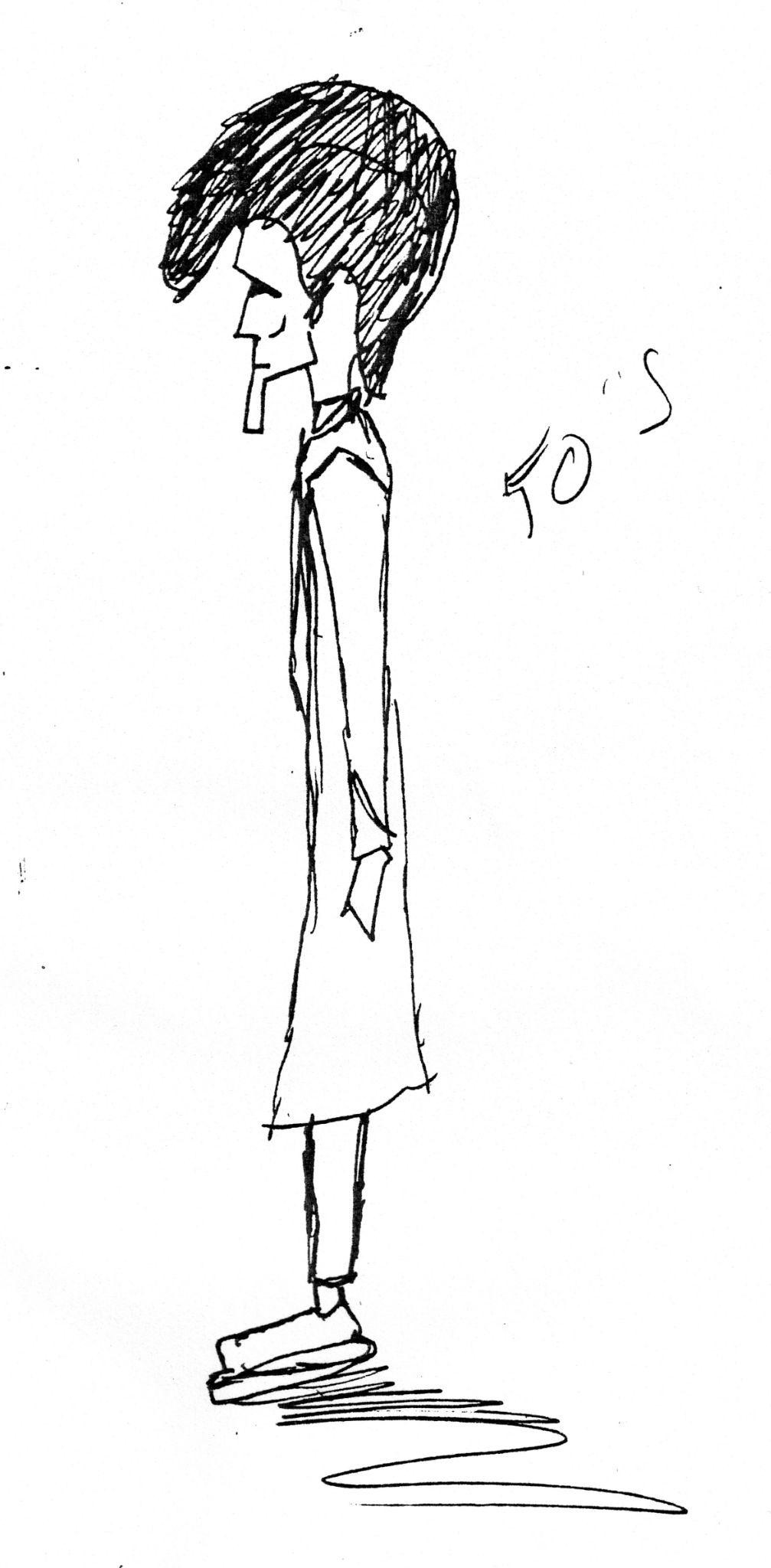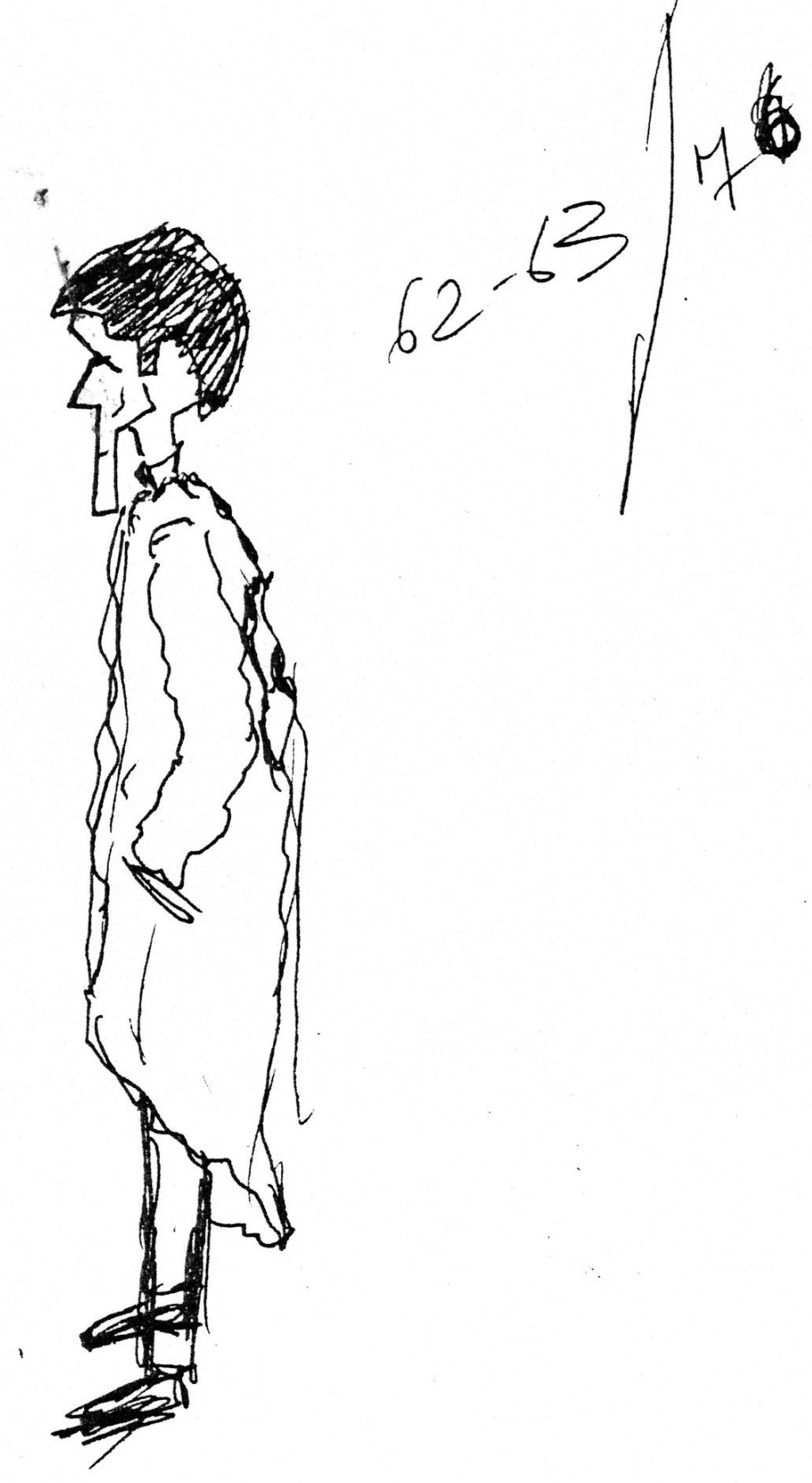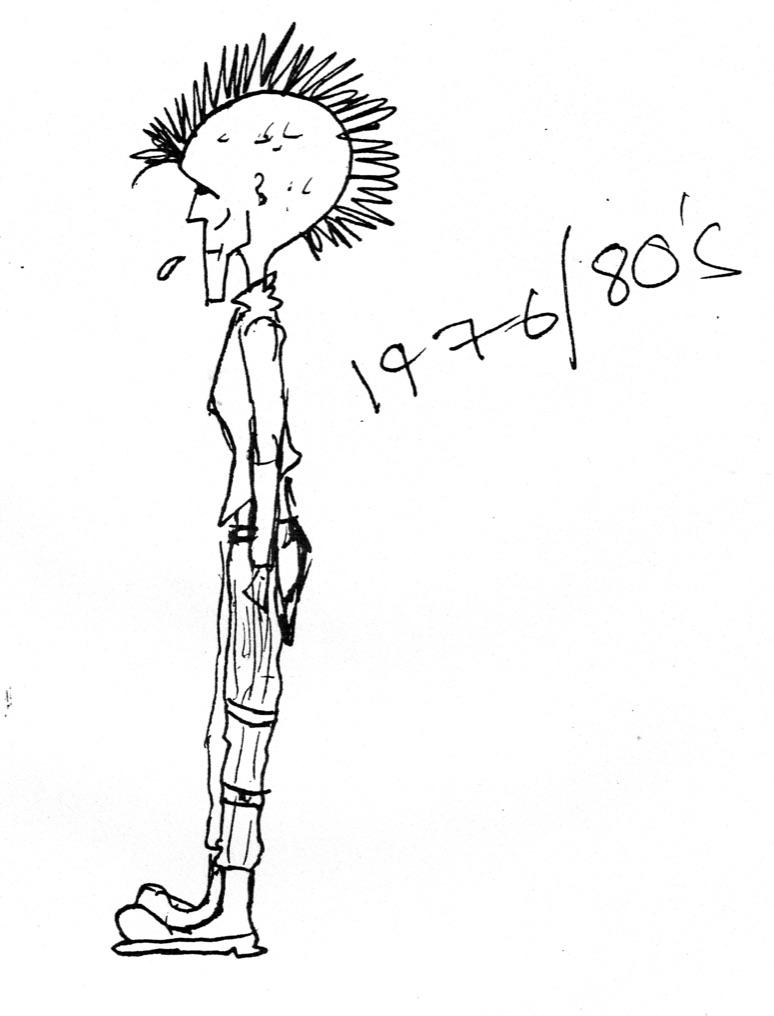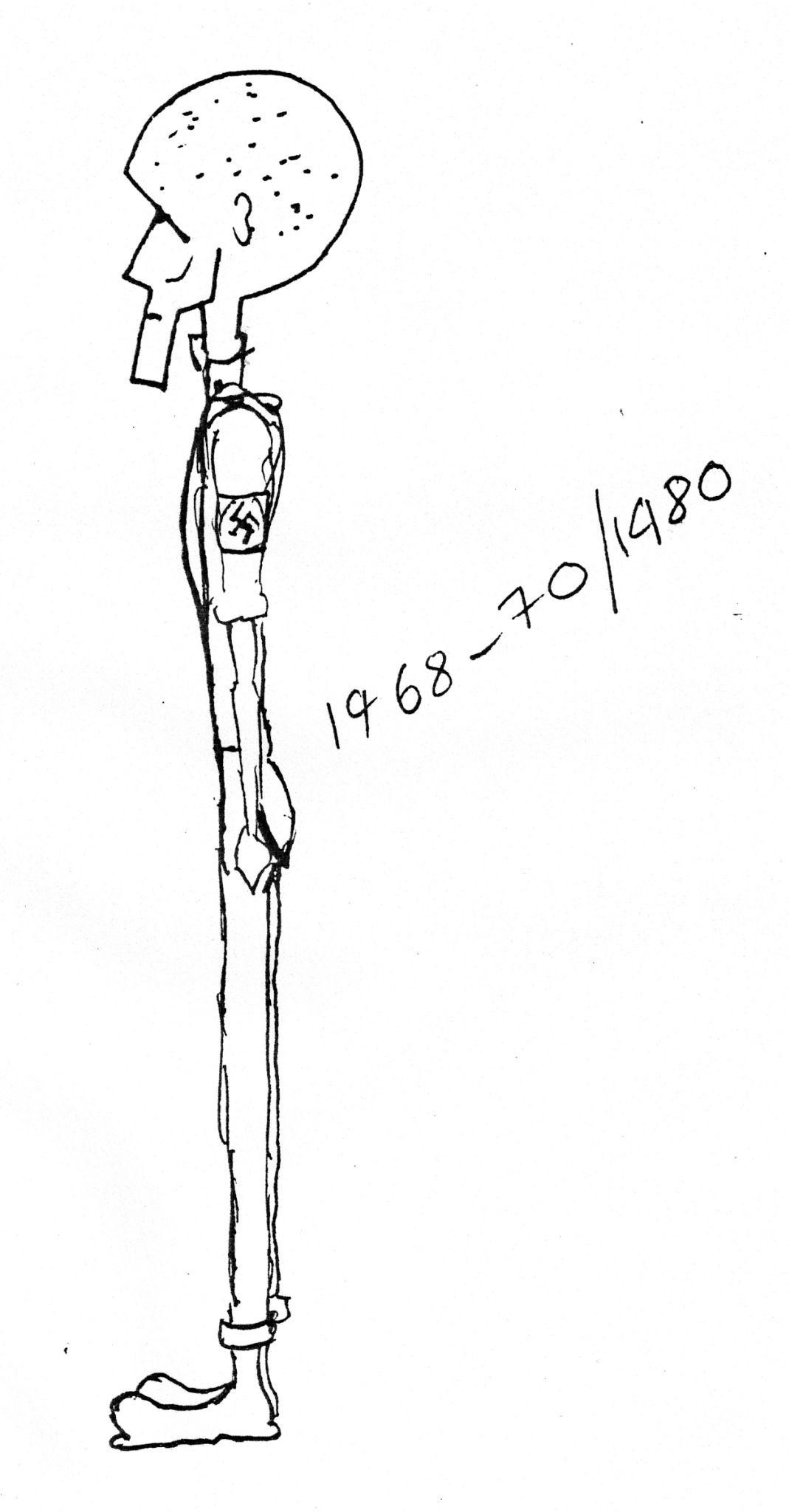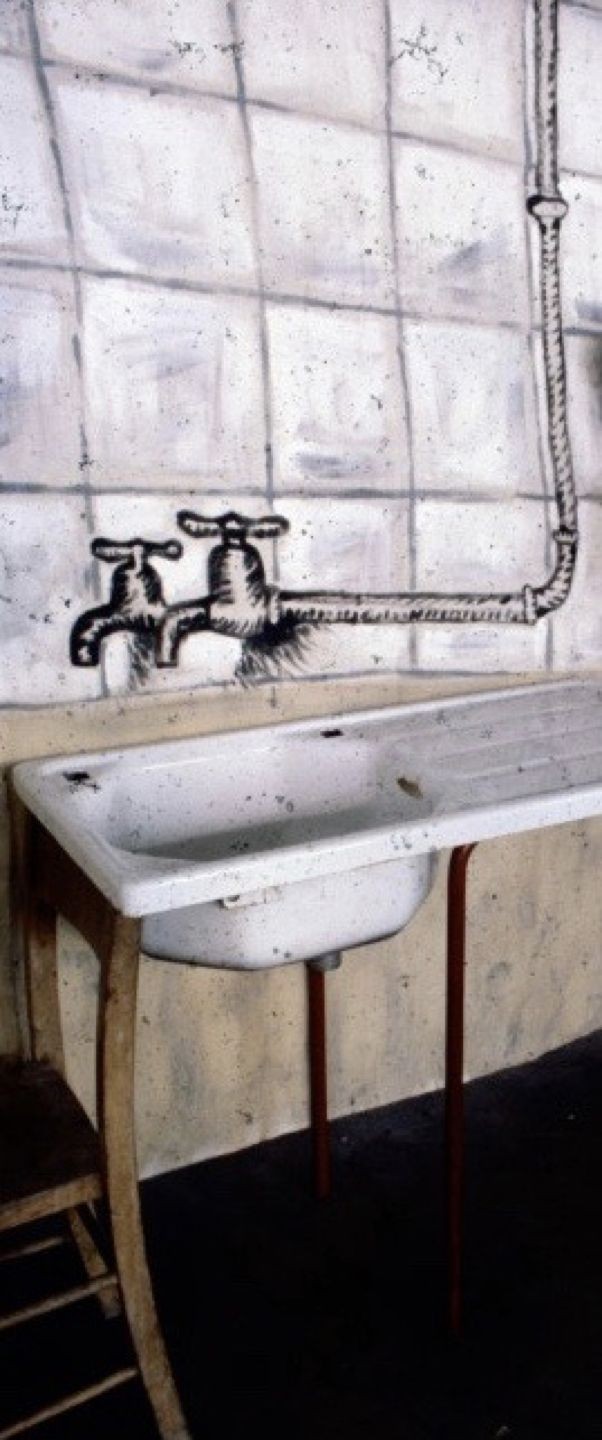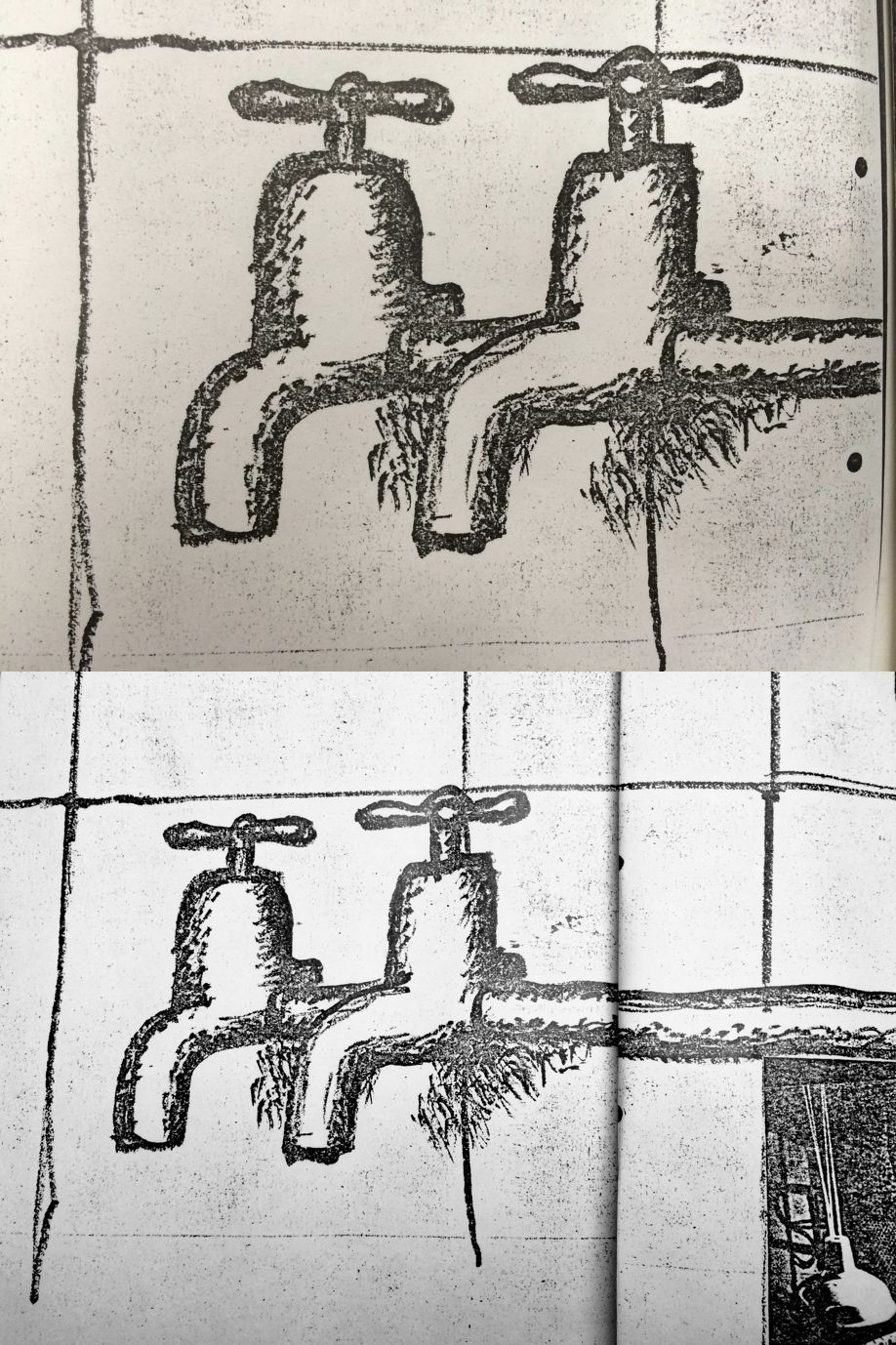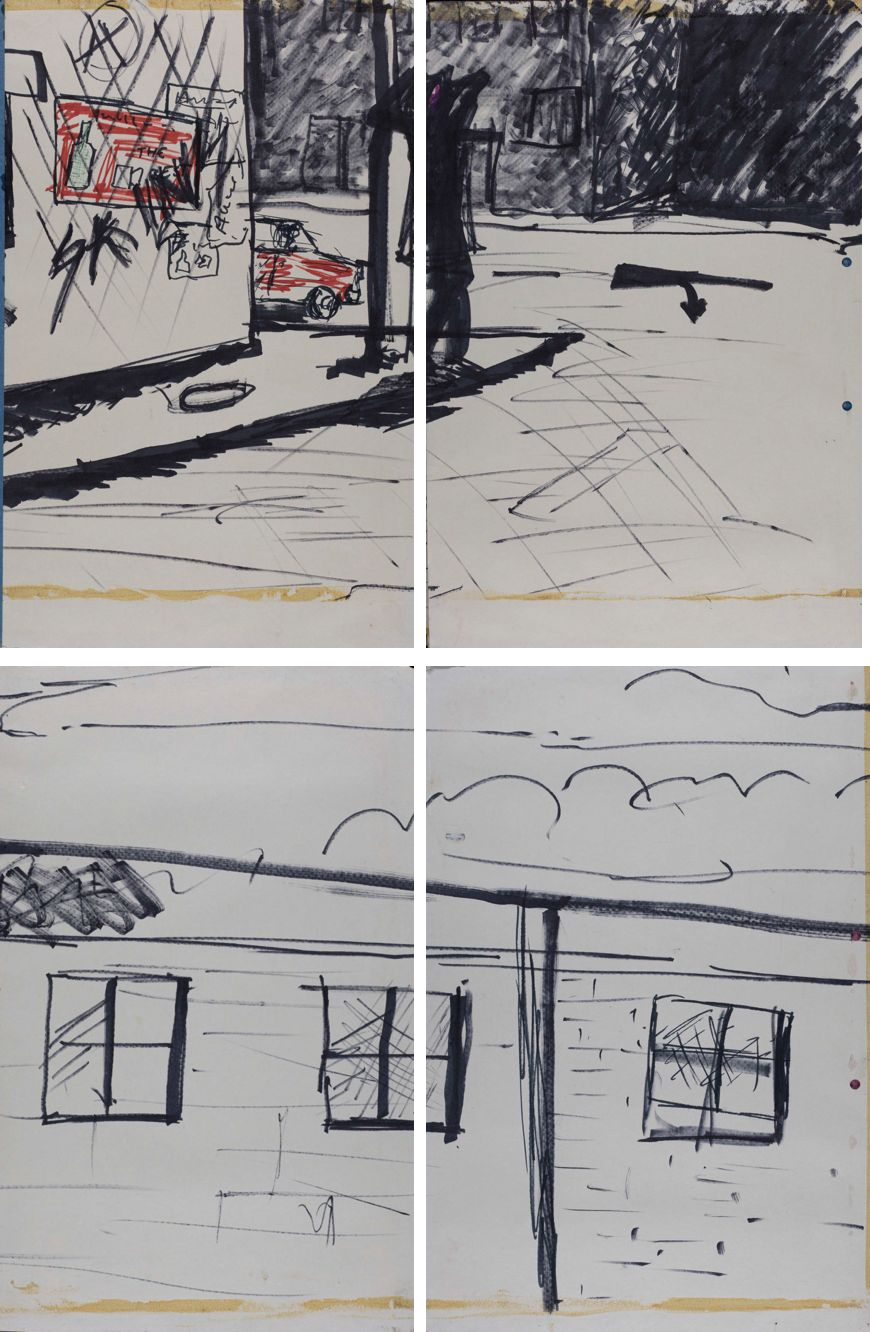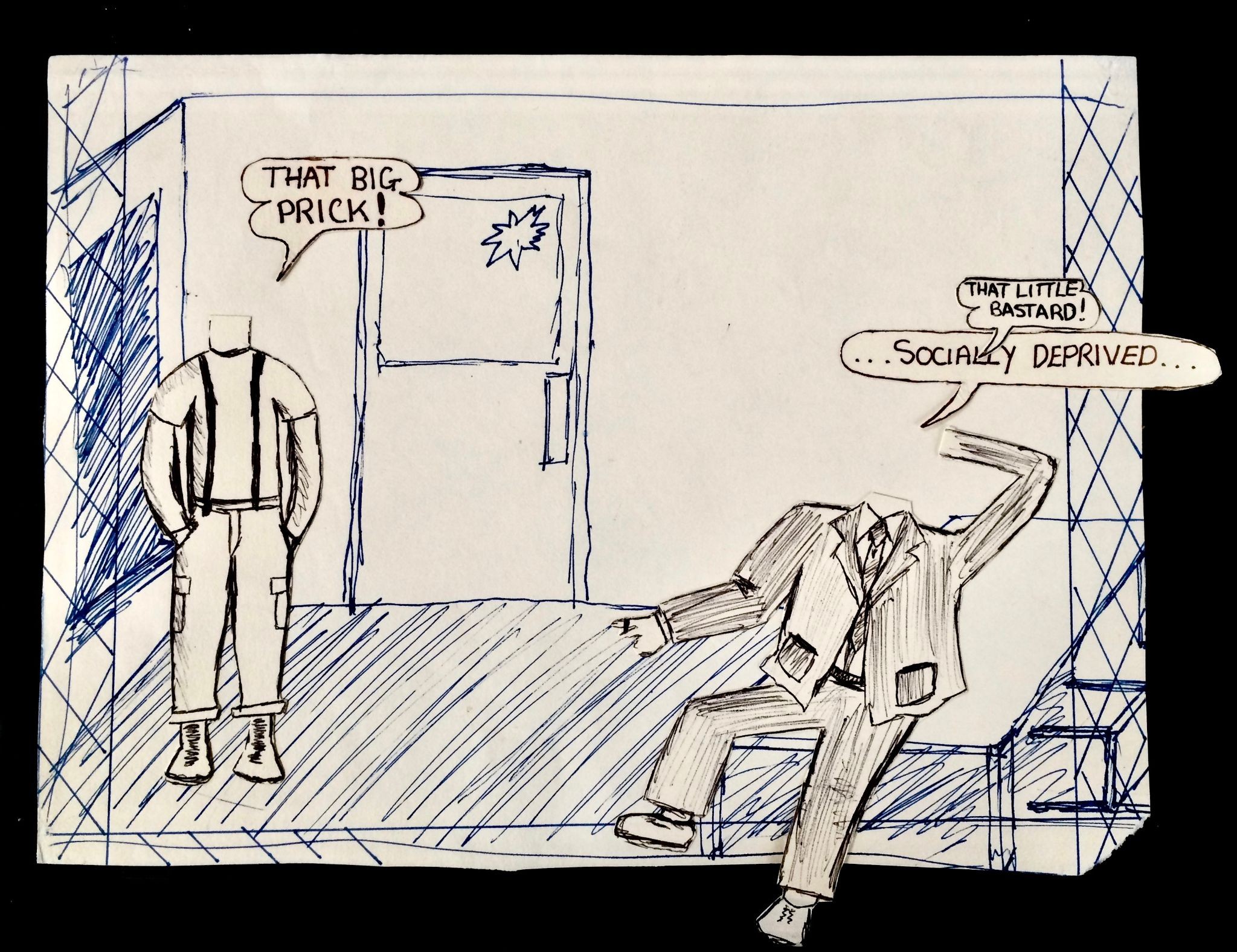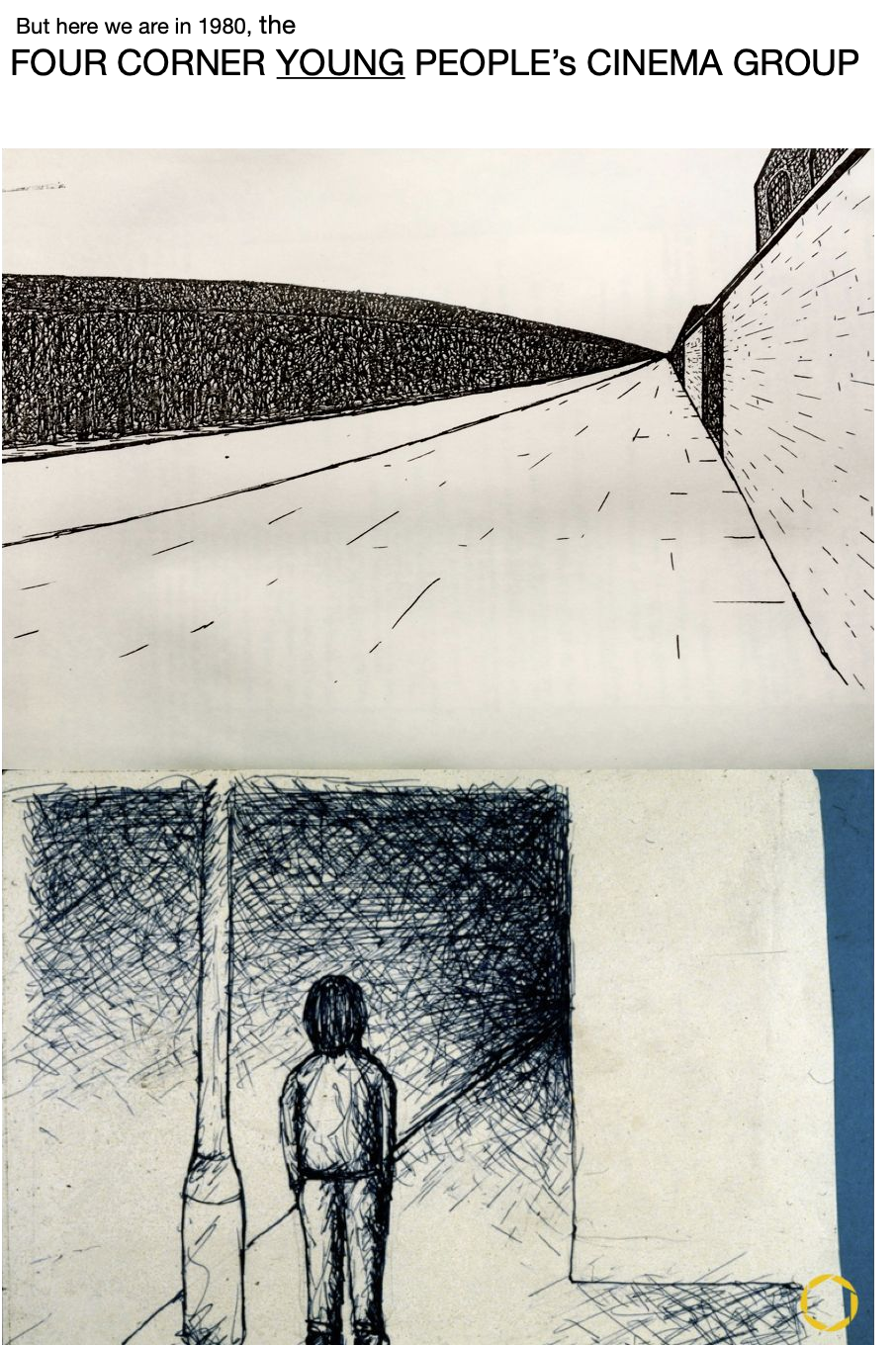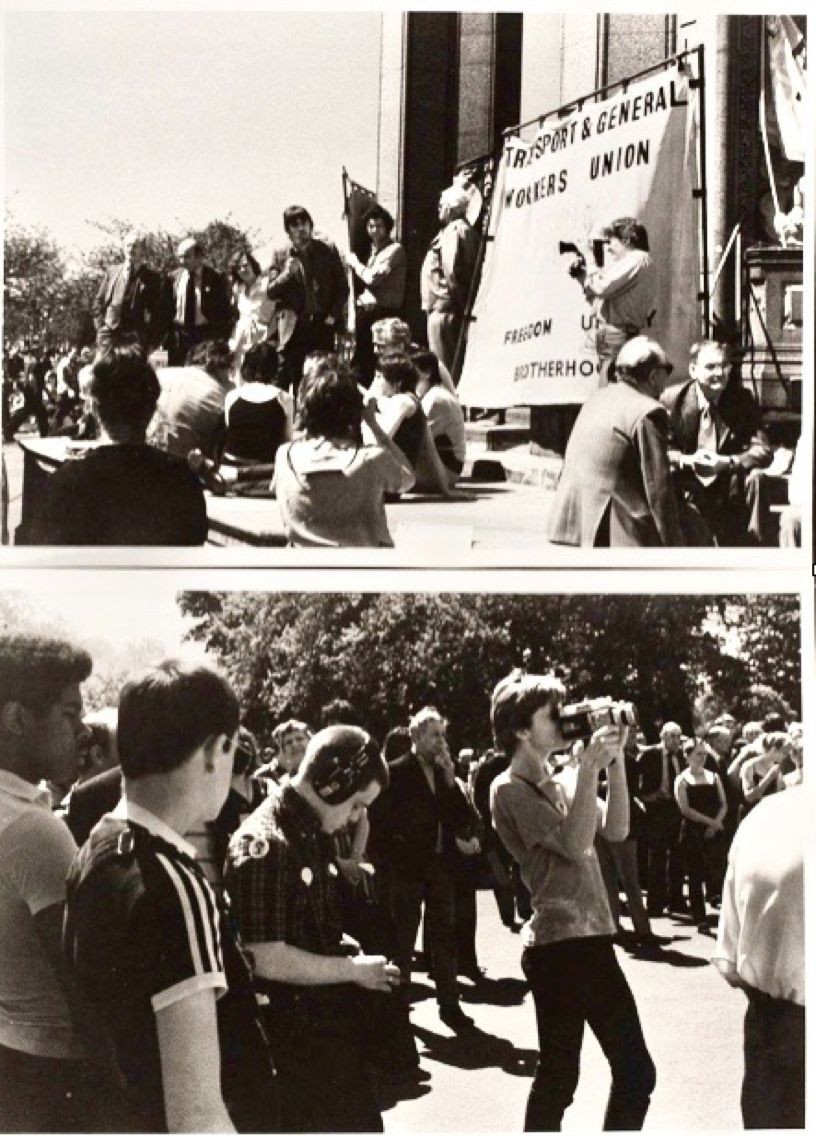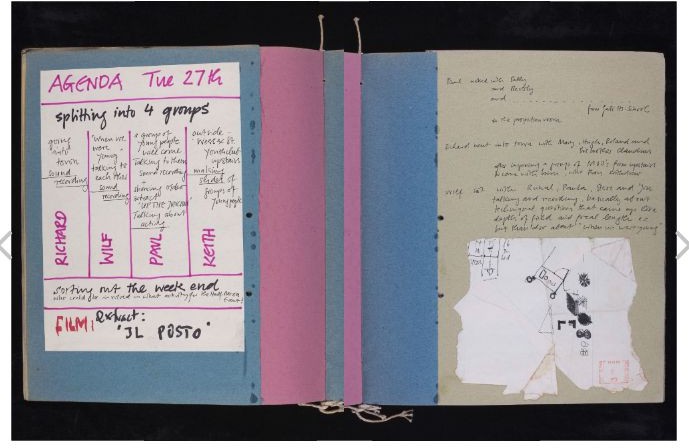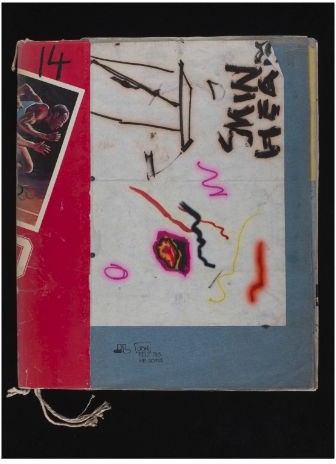THE STORY
1 8 S C R A P B O O K S
made in The Cinema Workshop with Young People from 1979 to 1980
at FOUR CORNER FILMS in Bethnal Green in East London
by WILF THUST
You can access 750 scanned pages of these books in
https://reverso.spc.org/central-saint-martins/
Four Corners eBooks 01-03 | 04-06 | 07-09 |
10-12 | 13-15 | 16-18
All archival material courtesy of Wilf Thust, founder member of Four Corners in 1974
This book looks back to how the whole project came about
and looks forward to what it still evokes.
It consists of excerpts and comments and as such is an assembly. These 55 pages are a shortcut of the bigger book
STARTING FROM SCRATCH with 230 pages.
Feel free to flicker through and take in what appeals to you.
24
Anthony Davies took part in this project when he was
- I met him again in 2013 as co-founder of May Day Rooms, an archive for social movements as well as
for experimental and marginal cultures. He scanned every page of the 18 Scrapbooks from 1980 with his students of The Experimental Teaching Unit in Central School of St Martins in London because he found something in them that both interested him and, in particular seemed to resonate with the experiences and realities faced by other young people, and those far away from the East End of London. As part of a British Council project with CSM he shared the Scrapbooks in 2018 with people who opened a youth center for young people living in favelas around Sao Paulo. He wrote to me from there:
“I am still here in Brazil but wanted to let you know that we ‘delivered’ your Four Corners Scrapbooks to favela communities here in Sao Paulo who were incredibly excited to see their work reflected in the past, in London, in yours!!
I think that it’s remarkable that the work you did in London in the 1970s has such traction, and has so many connections here in Sao Paulo in 2018. We have set up a WordPress site called Reverso. Our initial contribution to this was the complete Four Corners Scrapbooks (over 750 pages!) as eBooks
http://reverso.resourceforge.org/central-saint-martins/fo ur- corners-ebooks.
https://reverso.spc.org/central-saint-martins/
FOUR CORNERS. In 1973, behind a shop front at 113 Roman Road, London E1, four young filmmakers – Joanna Davis, Mary Pat Leece, Ronald Peck and Wilf Thust – set up a cinema and production studio with the aim of introducing “films and filmmaking to those who had previously been excluded from the whole practice”. In the context of a polarised and politically charged Bethnal Green of the 1970s, many local children and young adults found at Four Corners – and in Wilf Thust’s workshops in particular – a sanctuary where they could explore forms of self-representation and develop vocabularies of commonality, resistance and dissent. (MayDay Rooms, 2014).
In October 2017, Wilf Thust deposited 18 scrapbooks to the Memory Room and Experimental Teaching Unit at Central Saint Martins College. Below is a complete collection of digital documents from the scrapbooks and an explanatory letter from Wilf outlining his approach to working with children and young adults “Four Corners, My Points of View”. These eBooks are free to download and distribute and if used for anything other than educational purposes, should be credited to ‘The collection of Wilf Thust, 2018’
STARTING FROM SCRATCH
is an appeal to myself to rethink and act. This book here contains a collection of excerpts from more than 750 Scrapbook pages from a workshop I did in 1979-80 and is meant to be a bridge to understand, appreciate and share the original intentions and practices of working with young people in the East End of London. The essence of my Cinema Workshops had been to respond to the impulses of young people with openness and guidance but not with any pressure on results. This approach followed no fixed pedagogy. It was intended to be a response to researchers on the politics of working class youth and the history of the East End of London at the time of the 70s. This also resulted in THE EAST END CINEMA TAPE. Our practice meant we took risks, working with people that we didn’t know and met almost accidentally.
Through this year-long project we touched on many elements of film making but never intended to create young filmmakers. This project might be seen as moving away from the idea of film as a “Gesamtkunstwerk”, meaning this is not a comprehensive art form that tries to put all artistic values into a one sensational product.
HERE instead the different artistic elements of a film are seen as a series of components, as a kind of building blocks that have value in their own right. You could describe this kind of filmmaking as an invitation to walk through a town that is full of activities, and by looking amongst the streets you find your own inspiration to support your work.
This is – after we four London Film School Students entered the empty SILVERMAN shop we made a place for our living and then for our workshop creation FOUR CORNERS in 1975.
This is the view of FOUR CORNERS in 1980 in expectation of a new ground floor with a 40-seat cinema with meeting and cutting rooms, a darkroom and a workshop for equipment as well as a show window as you can see here.
We started with where people are and what they are up to,
and with 4 different essentials:
- a screen or monitor and films to show,
- a studio floor to recreate a location, their Where is your “studio”, your “home” to start from ?
- with actions of their choice, ideas, themes, titles, –
a film needs a working title – and
- last not least a camera, a tripod and props and …is there even the smallest budget ?
This sketch illustrates 4 main areas of concern, in our case with four guardians:
WILF to get it going,
PAUL as script writer and communicator, KEITH as technical support and camera man and
RICHARD as film editor.
All of us working as a group prepared to share necessary jobs.
I find 4 the best number of people to work with. I wouldn’t like to start a workshop on my own. Teaching would be more engaging, more enjoyable, more effective and rewarding with a team of 4. Four people bring different qualities but first of all different moods and different feelings of each other.
We supported an event by the singer and poet Pat Fitzgerald
We scratched Ektachrome slides with a sharp needle for projections
Paul and Wilf
Part of our research about Groups and GANGS on a poster for events with pupils who we invited to join in from schools around us.
Here are how five newspapers reacted.
Directed by Bill Forsyth
What a cunning description of the mood of so many depressed young people.
This independent film involves non actors and was like a mirror of our own film making intentions.
What a treat to meet the director and the actors coming to our screening of it to pupils.
Paul Hallam working in a script session.
This was the second part of our course and a fresh start to come up with a script that we wanted and could agree on as these notes by Paul make clear.
Paul Hallam working in a script session.
paul:
Vor einer der Workshop-Veranstaltungen im Half Moon war ich mit ein paar Workshop-Teenagern in der Kneipe. Michael hatte gerade ein kurzes Gefecht mit der Polizei hinter sich – er hatte einen davon angemacht, der zu diesem Zeitpunkt zu Pferd saß. Eine Erwähnung der Polizei führte tendenziell zu einem Dutzend weiterer. In einem Drehbuch-Workshop löste die erste Erwähnung der Schule eine ganze Flut von Kommentaren und Angriffen auf die Schule aus. In den ersten Tagen des Workshops fand das Reden und Herumalbern größtenteils unter den Teenagern selbst statt. Die Arbeit an den Half Moon-Shows schien dies ein wenig aufzulockern. Dann gingen wir zu Drehbuch- und Video Sitzungen, Musikworkshops im Crypt und vielen weiteren Kneipen Besuchen über. Endlich schien es zumindest einigen Erwachsenen möglich, sich an den Gesprächen zu beteiligen, anstatt zuzuhören, mitzumachen und sich zu entspannen.
Normalerweise fiel es mir leichter zu reden, wenn nur wenige Erwachsene Mitglieder der Werkstatt da waren. Der Umgang mit den Teenagern beeinflusste nach und nach die Art, wie ich redete. Es fiel mir leichter, über meinen eigenen Hintergrund, Erfahrungen in der Schule, meine Vorlieben an Theater, Musik, Film usw. zu sprechen, als ich es normalerweise tue. Meine Sprache hat sich ein wenig gelockert – die Jahre, in denen ich mich von meinem Hintergrund entfernt und in die Mittelschicht abgewandert bin, haben meiner Meinung nach dazu geführt, dass ich meine Sprache immer wieder unter Kontrolle habe.
Die Zugehörigkeit zu einer jungen und vorwiegend aus der Arbeiterklasse stammenden Gruppe außerhalb der Schule, weit weg von zu Hause und in der nächstgelegenen Stadt (Theaterworkshops im Nottingham Playhouse), die Auswirkungen des Wechsels von Klasse zu Klasse, die komplexe Erfahrung von „Kultur“ in diesem Alter (damit verbunden auch an meinem Sexualleben bzw. dessen Fehlen – die einzigen Schwulen, die ich damals kennengelernt habe, waren in Theaterstücken oder Romanen zu finden)… viele Dinge, mit denen ich mich immer noch beschäftige. All die grundlegenden Unterschiede zwischen den Menschen, mit denen ich jetzt die meiste Zeit verbringe, und den jungen Menschen fielen mir immer mehr auf.
Auch wenn diese Dinge offensichtlich sind, vergisst man leicht, womit junge Menschen es zu tun haben. Wir streiten vielleicht darüber, wie und wo wir am besten leben können (allein, zu zweit, mit einer Gruppe von Freunden usw.) – die meisten Kinder haben keine andere Wahl.
Sie sind an Eltern, Haus und Hausregeln gebunden. Vielleicht denken wir darüber nach, wie wir unser Geld am besten ausgeben können, die meisten der Kinder bekommen nur Taschengeld oder schlecht bezahlte Samstagsjobs oder sie müssen fragen, betteln, schnorren oder stehlen. Wir fragen uns vielleicht, ob wir nicht den richtigen Job haben und auf die richtige Art und Weise arbeiten. Sie müssen sich entscheiden, ob sie die Schule, die ihnen oft nicht gefällt, abbrechen oder sich für einen schlecht bezahlten Job, eine Ausbildung oder ein „Ausbildungsprogramm“ entscheiden – wenn sie überhaupt einen Job bekommen können. Sie könnten zu den zwei Millionen Arbeitslosen gehören. Sie absolvieren Prüfungen, versuchen an Hochschulen aufgenommen zu werden – und wenn sie es nicht schaffen, versuchen sie, eine Alternative zu finden.
Sie sind mit einer ganzen Reihe von Gesetzen und Beschränkungen konfrontiert, die für Erwachsene einfach nicht gelten – und es gibt nur wenige billige Orte, in denen sie ein Zusammensein genießen können. Der Workshop kann zumindest bei Letzterem ein wenig helfen.
Viele Unterdrückungen kommen einfach in alltäglichen Gesprächen zur Sprache. Jemand wird darüber reden, dass er sich einen Roller wünscht – aber er kann es sich nicht leisten und das Gesetz und/oder die Eltern erlauben ihm sowieso nicht damit zu fahren. Eines der Mädchen kann möglicherweise nicht an den Workshops teilnehmen – mindestens zwei von ihnen haben regelmäßig zu Hause auf jüngere Geschwister aufzupassen. Sie sprechen mit mir nicht darüber, aber einige von ihnen haben es ziemlich schwer. Zu Hause oder mit Ihrer Sexualität. Eine Reaktion auf eine bestimmte Form der Unterdrückung (Rasse, Geschlecht, die Unterdrückung junger Menschen) kann dadurch hervorgerufen werden, dass wir einen Film zeigen oder ein bestimmtes Video oder Bild einspielen – aber oft besteht kein Bedarf für einen solchen besonderen Anreiz.
Unter ihnen gibt es Auseinandersetzungen und Diskussionen über Rasse, Geschlecht, Klasse – beides umgeben von vielen gewöhnlichen und spielerischen Gesprächen, oder darin eingearbeitet.
Der Workshop ist meiner Meinung nach in erster Linie ein Ort, an dem diese Dialoge stattfinden und Möglichkeiten gefunden werden, mit Filmen darauf zu reagieren. Ich bin mir jedoch bewusst, dass das oben Genannte die Workshops vereinfacht und viel trockener klingt, als sie tatsächlich sind.
Anthony Davies
Lisa Warren
Michael Winslow
Paul Hallam working in a script session.
Paul Hallam working in a script session.
PAUL
developments – band forming through Crypt music sessions … music often seems much easier for them to get involved with than film…amongst the
teenagers don’t sense a vast interest in film, but gradually people beginning to pick up cameras and some wanting to work more solidly… slow developments… various individuals and groups calling around at Four Corners over summer (prefer being around to being at home outside of workshop “term’)…importance of length of sessions – 4 hours, compare with school time (40 minute classes)…first hour or so spent on arriving, nipping out and getting chips, talking about parties they’ve been to over weekend, things which would be impossible in school…for me at any rate the workshop is an attack on school…main direct effect school had on workshops – during exam time everyone was that bit more tense…Features
of workshops: cadging fags, mucking around with lighters and matches, blurbs, jokes, imitation fart noises, mock, and (very rarely) real fights (they
fade out or are broken up by the teenagers themselves, not by us)
…endless stories about parties, planning fights or parties, trouble with rival groups, gangs, styles, stories of getting drunk, people wandering in and out during the evening, getting food, fags or just getting away for a while…constant noise…laughter (lot of)…changing styles (mod to skin or vice-versa) in quite short periods of time…talking about weather it is worthwhile developing a particular style, identifying with particular groups…or wether that just leads to more aggro than it’s worth…using up the felt tips on paper lying around (bits of wood, clothes from nearby jumble sale cupboard etc – and playing around with them,…stories of scooters, cafes, visits to Brighton, gigs, glue sniffing, other people at school…sending up teachers, police, figures they’ve had to escape from (ticket inspectors etc)…quieter stories of problems friends have had at home…being thrown out of pubs, attacks on “posh cunts”, trendies, real ale drinkers…complexity of hearing word “cunt” endlessly from girls and boys – standard anti-sexist condemnation often inadequate, not taking into account different ways words can be used and background to that
…do you throw somebody out of British Movement leanings ? – or let the Socialist Worker Party and Anti Nazi league contingent among the teenagers argue it out ? …sexism often brought up by them and adult members of workshops, but sex itself still very little talked about (even in jokes)…not knowing what a lot of shyer members think about workshop (takes a long time to talk easily with quite a few of them – but they do keep coming)…no “girls only” activity as yet (4 men primarily involved in workshop)…few girls seem to want it and none of women coming to workshops really pushed for any separate group…often three photographers around, felt their role was very very unquestioned – by themselves, by the subjects…enjoyment of being in film, tapes, slides still very strong after a year – their enjoyment of the play back plus the weekly question
– printed any more photos Sally
?…Lisa’s script written probably in an hour altogether, and in very noisy conditions – my envy…amazingly fast, funny and accurate dialogue…Need to get away from “realism” – more distance film work, not just give a weak version of what the teenager’s dialogue is like (never comes out right in film)…Michael’s instant and good humored drawings plus his role as entertainer
… sending up accents… lot of the teenagers coming along in same sex Pairs…endless gossip and interpretations of workshop relationships (by adults of teenagers and vice -versa) – often completely different interpretations…after a few months people talking about their first impressions of each other (often very funny) -…comments and questions about when do we make a “real” film – after making Don’t Think So !!…should we work more intensively on something or allow the workshop to get even more loose than it is ?… more skill and project oriented workshops
?…became clear over year that views varied…amongst those setting up workshops and amongst those coming…now trying to work out different kinds of workshops to cater for those views…Importance of having a box of pens/ felt tips around and not counting…over year only one large felt tip reported missing (and that was predictable)…Visits by funding bodies…a huge problem, their presence dampens and changes workshop easily – they are like school “open days”…sometimes there are 14 teenagers and at others 4 – depending on what we are doing, or one teenager not coming might lead to a whole group deciding not to…no desire to keep ‘registers’…
PAUL:
Entwicklungen – eine Rock Band geformt durch Crypt-Musik-Sessions
… Musik scheint für sie viel einfacher zu beherrschen als Filme … unter Teenagern spüre ich kein großes Interesse am Filmen, aber nach und nach fangen Leute an, Kameras in die Hand zu nehmen, und einige wollen ernsthaft mitmachen …
Langsame Entwicklungen … Verschiedene Einzelpersonen und Gruppen kommen im Sommer bei Four Corners vorbei (sie bevorzugen es, in der Nähe zu sein, und nicht zu Hause) … Die Dauer eines Workshops ist wichtig – 4 Stunden, im Vergleich mit 40-minuten Unterricht in der Schule) …die erste Stunde mit uns vergeht mit dem Ankommen, dazu gehört gleich wieder raus zu gehen, um etwas zu essen und Chips zu kaufen, über Partys zu reden, auf denen sie am Wochenende waren, Dinge, die in der Schule unmöglich wären … Für mich ist der Workshop in jeder Weise ein Angriff auf die Schule
… der Haupt Einfluß der Schule auf die Workshops ist – dass während der Prüfungszeit alle etwas angespannt sind…Eigenheiten der Workshops sind:
Kippen erbetteln, herumalbern, mit Feuerzeugen und Streichhölzern spielen, Rülpser, Witze, Fürze imitieren, Spott – und (selten auch) echte Kämpfe ausführen (sie vergehen schnell oder werden von den Teenagern selbst aufgelöst, nicht von uns),
.
rivalisierende Gruppen, Banden, Stile, Geschichten über Betrunken werden, Teilnehmer, die im Laufe des Abends ein – und ausgehen, besorgen was zum Essen, holen Zigaretten oder bleiben einfach nur eine Weile weg … ständiger Lärm … Gelächter (sehr viel) … Stile verändern (Mod zu Skin oder umgekehrt) in relativ kurzer Zeit
… Wenn es ums Wetter geht, lohnt es sich, einen besonderen Stil zu entwickeln, um sich mit bestimmten Gruppen zu identifizieren … oder zu entscheiden, ob das nur zu mehr Aggro führt, und ob es das wert ist … die Filzstifte an den herumliegenden Papieren (Holzstücken, Kleidern aus dem nahegelegenen Flohmarkt usw.) zu verbrauchen und damit herumzuspielen, … Geschichten von Motorrollern, Cafés, Besuche in Brighton, Auftritte, Leimschnüffeln, andere Leute in der Schule aufziehen… so auch Lehrer, Polizisten und Gestalten, vor denen sie fliehen mussten (Fahrkartenkontrolleure usw.)
… stillere Geschichten über Probleme, die Freunde zu Hause hatten … Rausschmiss aus Kneipen, Angriffe auf „vornehme Fotzen“, Trend Menschen, Real-Ale-Trinkers…ohne die Komplexität des Wortes „Fotze“ zu beachten, endlos gebraucht von Mädchen und Jungen – übliche antisexistische Verurteilungen sind oft nicht angebracht und berücksichtigen nicht die unterschiedlichen Anwendungen von Wörtern und Ursprüngen dieses Gebrauchs
…schließt man ein Mitglied britischer Nationalisten aus? – oder lässt man die Gruppe der Sozialistischen Arbeiter Partei und der Anti-Nazi-Liga unter den Teenagern selbst darüber entscheiden
… Sexismus wird oft von ihnen, aber auch von Erwachsenen
Workshop-Mitgliedern wahrgenommen, aber über Sex selbst wird immer noch sehr wenig gesprochen (sogar in Witzen) … Ich weiß nicht, was viele schüchterne Mitglieder über den Workshop denken (es dauert lange, sich mit einigen von ihnen locker zu unterhalten – sie kommen aber immer wieder) … Nein „Nur für Mädchen”
-Aktivität bisher nicht (hauptsächlich sind es 4 Männer die den Workshop leiten) …und nur wenige Mädchen scheinen das zu wollen und keine der Frauen, die zu den Workshops kommen drängen wirklich auf eine separate Gruppe, …häufig waren 3 Fotografen da, deren Rolle sehr sehr wenig hinterfragt wurde, zwischen ihnen selbst und bei den Betroffenen nicht…aber deren Freude am Filmen, den Dias, Kassetten, war auch nach einem Jahr noch immer sehr groß – so ihre Freude an den Ergebnissen und der Frage nach jeder Woche – “hast Du neue Fotos entwickelt, Sally ?”…Lisas Drehbuch wurde wahrscheinlich insgesamt in einer Stunde geschrieben und unter sehr lauten Bedingungen – ich beneide das…erstaunlich schnelle, witzige und präzise Dialoge…muss vom
„Realismus“ wegkommen – mehr Distanz bewundern… das hier ist keine schwache Leistung… der Dialog zwischen Teenagers hier käme in einem “Film” nie richtig zur Geltung … Michaels spontanenund witzigen Zeichnungen plus seine Rolle als Entertainer…
…Akzente setzen…viele der Teenager kommen in gleichgeschlechtlichen Paaren … endloser Klatsch und Interpretationen von – Beziehungen (über Erwachsene zu Teenagern und umgekehrt) – oft völlig unterschiedliche Interpretationen … nach ein paar Monaten sprechen die Leute über ihre ersten Eindrücke voneinander (oft sehr lustig) –… Kommentare und Fragen darüber, wann wir einen „ richtigen“ – Film – machen, nach Don’t Think So
!…sollten wir noch intensiver weiter arbeiten oder zulassen, dass der Workshop noch lockerer wird, als er so schon ist ?…oder mehr kompetenz – und projektorientierte Workshops ?…Im Laufe des Jahres wurden die unterschiedlichen Ansichten deutlich… bei denen, die die Workshops planten, und bei denen, die kamen … und jetzt versuchen, verschiedene Arten von Workshops vorzuschlagen, um unterschiedlichen Ansichten Rechnung zu tragen … Es ist wichtig, eine Schachtel mit Stiften/ Felt tip pens dabei zu haben und nach Gebrauch nicht zu zählen … Im Laufe des Jahres wurde
nur EIN großer Filzstift vermisst (und das war vorhersehbar) … Besuche von Förderorganisationen … ein riesiges Problem, Ihre Anwesenheit dämpft und verändert schnell jeden Workshop – es wirkt dann wie „Tage der offenen Tür“ in der Schule…bei uns sind es manchmal 14 Teenager und manchmal 4 – je nachdem, was wir machen, oder ein Teenager, der nicht kommt, kann dazu führen, dass sich eine ganze Gruppe dagegen entscheidet …keine Lust bei uns, „Register“ zu führen…
DON’T THINK SO
Unforgettable the day of ACTION in Victoria Park with bands and banners and all of us taking part in some way or the other.
I t w a s t h e r i g h t f i n i s h i n g p a r t y
Richard
I was involved in most of the conceptual side of what we’ve done, at the beginning with a certain non-directional enthusiasm, a
feeling that what we were doing was interesting and potentially useful. Over the year I have become far clearer about what I am interested in and what aspect of the sessions I have enjoyed most, and feel that I have gained a lot of experience which I hope I can draw on when from September on I am running project based sessions.
I tend to be fairly conventional in my approach to film-making. I still don’t know what I feel about group film making as experienced in our sessions…
I have had some fun editing bits of Don’t Think So, but shouldn’t someone else have been using it to learn the basics ? Does it actually matter if it’s finished ?
I think so, but should it ?
This friendly list of Cinema Workshop members we should have sent to “a funding body” instead …
This list was not handed over to GLAA Greater London Arts Association to justify our doing. In any case, it was hardly complete. Members changed from session to sessions.
We certainly have to thank GLAA supporting us. We understood that there are many groups applying. We had to make up lists of participants, but it is important for funders to get an inside and understanding of what is going on. From our end that would mean to get to know who make decisions and to join meetings. There wasn’t enough time for that. We hadn’t planned it in.
Pages from 3 Scrapbooks
https://reverso.resourceforge.org/central-saint-martins/four-corners-ebooks-
Four Corners eBooks 01-03 | 04-06 | 07-09 | 10-12 | 13-15 | 16-18
ANTHONY DAVIES
Starting from Scratch, an epilogue
On my meeting with Anthony Davies, I asked him about the meaning of ‘The Struggle’ and ‘The Community’ in relation to my book STARTING FROM SCRATCH based on Scrapbooks from the YOUNG PEOPLE CINEMA WORKSHOP IN 1979/80 with FOUR CORNERS.
Below is an adapted version of a transcript from our conversation on 23rd September 2021
Anthony Davies:
For me there are different routes into the question WHAT IS STRUGGLE? and I recall a comment by James Baldwin which might be helpful here. There is a key section in his extraordinary speech from 1963, THE ARTIST’S STRUGGLE FOR INTEGRITY (which I’ve often introduced to students), where he challenges the idea of supporting the struggle of others without first acknowledging the “…fantastic and terrifying liberation”, the commonality of all human struggle.
Note: Together we listened to the recording: Baldwin: “When I was very young (and I am sure this is true of everybody here), I assumed that no one had ever been born who was only five feet six inches tall, or been born poor, or been born ugly, or masturbated, or done all those things which were my private property when I was fifteen. No one had ever suffered the way I suffered. Then you discover, and I discovered this through Dostoevsky, that it is common. Everybody did it. Not only did everybody do it, everybody’s doing it. And all the time. It’s a fantastic and terrifying liberation.”
This example is useful in terms of any discussion on the Scrapbooks from the YOUNG PEOPLES CINEMA WORKSHOP in 1979/80 with FOUR CORNERS because it helps explain why we decided to take them to Sao Paulo, Brazil in 2019…… a “fantastic and terrifying liberation” indeed! I’d been to Sao Paulo before and had worked at a place called Casa do Povo/House of the People (CdP) as part of a residency programme. Although CdP’s remit was to establish connections and support various communities in Sao Paulo, arguably it had a managerial relationship to those it claimed to represent, with little evidence of any long-term social commitment. It soon became clear that many of the displaced and dispossessed communities the institution sought to engage, did not regard it as a House of the People, quite the contrary, many of those I encountered, regarded CdP as a zone of exclusion or worse. As a result, I walked away from the residency and started to forge connections with those more directly engaged in political struggle in the Peripheries/Favelas and Homeless Occupied House Movement, resulting in a “…fantastic and terrifying liberation” of recognising aspects of my own struggle on the streets of Sao Paulo. In retrospect, it was my participation in the Four Corners Children’s Workshops as a teenager in 1979/80 with its onus on community engagement and
self-determination which had alerted me to the limits of the more top-down managerialism of places like CdP.
I returned to London and after compiling a report, was invited to assemble a team and return to Sao Paulo, this time with funding from the CSM and the British Council to further develop and explore the potential of working with those I had met on the first trip, those outside the institutional framework. This coincided with the formation of an Experimental Teaching Unit at CSM and an event where we had invited you to present the Scrapbooks which you had recently rediscovered, and we had agreed to digitise for you. At the time, we were all struck by the way in which they gave a clear indication of how a more community-focused organisation like Four Corners functioned in terms of collective cultural production – more closely aligned to the DIY spaces we’d encountered in the Peripheries/Favelas and Homeless Occupied Houses.


